(Doc) Introduction to Entrepreneurship
VerifiedAdded on 2021/06/15
|21
|5450
|24
AI Summary
Contribute Materials
Your contribution can guide someone’s learning journey. Share your
documents today.
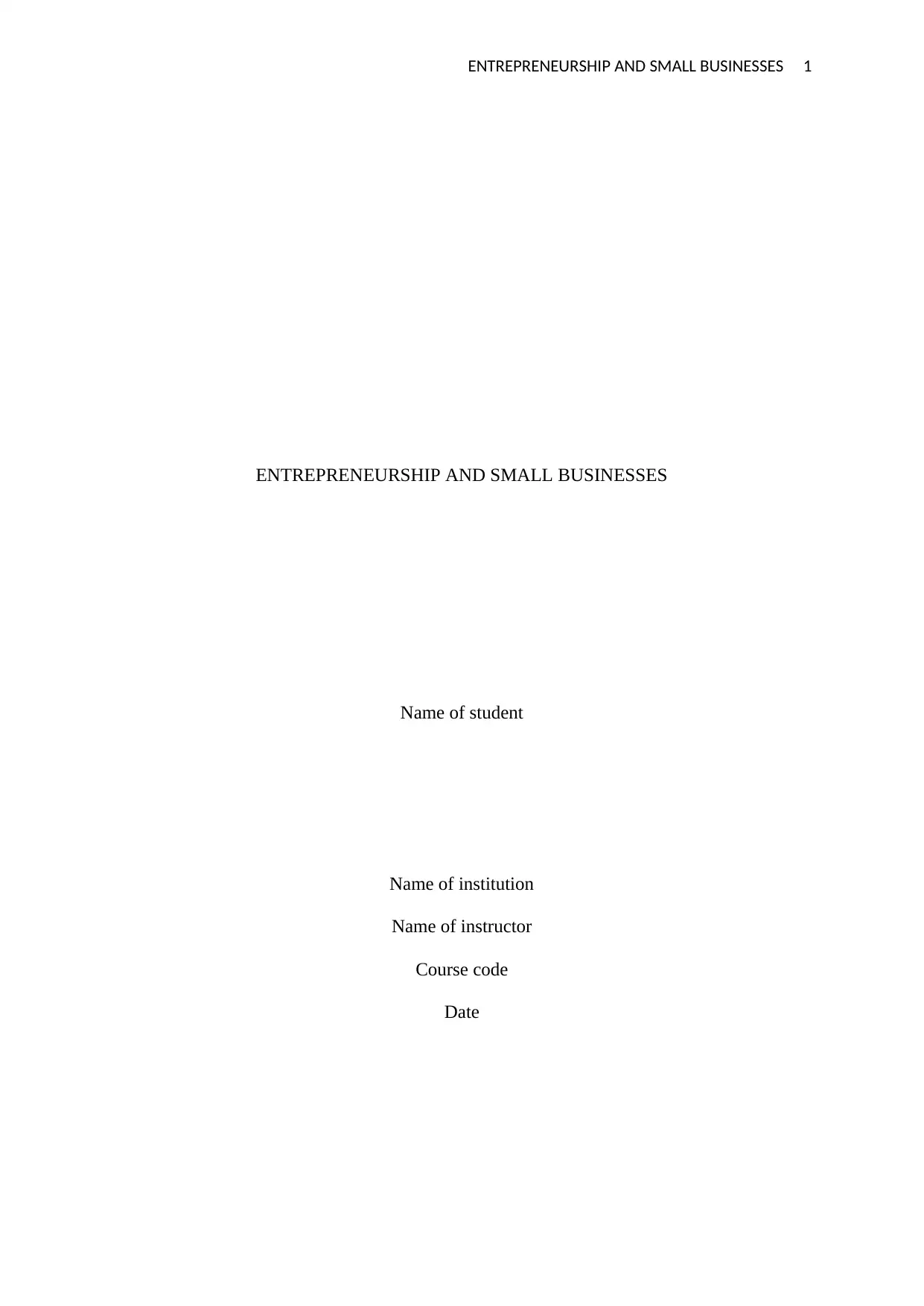
ENTREPRENEURSHIP AND SMALL BUSINESSES 1
ENTREPRENEURSHIP AND SMALL BUSINESSES
Name of student
Name of institution
Name of instructor
Course code
Date
ENTREPRENEURSHIP AND SMALL BUSINESSES
Name of student
Name of institution
Name of instructor
Course code
Date
Secure Best Marks with AI Grader
Need help grading? Try our AI Grader for instant feedback on your assignments.
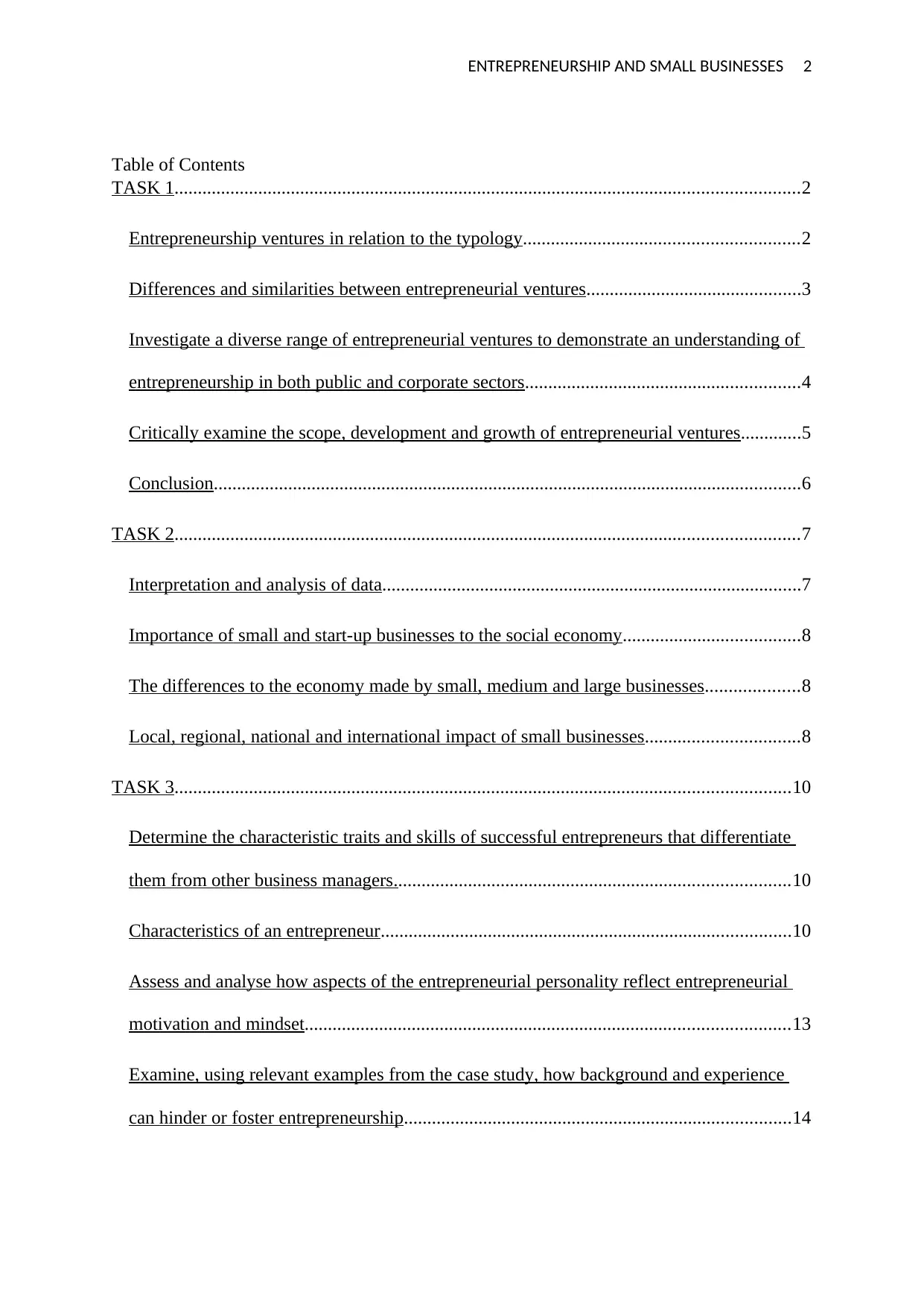
ENTREPRENEURSHIP AND SMALL BUSINESSES 2
Table of Contents
TASK 1......................................................................................................................................2
Entrepreneurship ventures in relation to the typology...........................................................2
Differences and similarities between entrepreneurial ventures..............................................3
Investigate a diverse range of entrepreneurial ventures to demonstrate an understanding of
entrepreneurship in both public and corporate sectors...........................................................4
Critically examine the scope, development and growth of entrepreneurial ventures.............5
Conclusion..............................................................................................................................6
TASK 2......................................................................................................................................7
Interpretation and analysis of data..........................................................................................7
Importance of small and start-up businesses to the social economy......................................8
The differences to the economy made by small, medium and large businesses....................8
Local, regional, national and international impact of small businesses.................................8
TASK 3....................................................................................................................................10
Determine the characteristic traits and skills of successful entrepreneurs that differentiate
them from other business managers.....................................................................................10
Characteristics of an entrepreneur........................................................................................10
Assess and analyse how aspects of the entrepreneurial personality reflect entrepreneurial
motivation and mindset........................................................................................................13
Examine, using relevant examples from the case study, how background and experience
can hinder or foster entrepreneurship...................................................................................14
Table of Contents
TASK 1......................................................................................................................................2
Entrepreneurship ventures in relation to the typology...........................................................2
Differences and similarities between entrepreneurial ventures..............................................3
Investigate a diverse range of entrepreneurial ventures to demonstrate an understanding of
entrepreneurship in both public and corporate sectors...........................................................4
Critically examine the scope, development and growth of entrepreneurial ventures.............5
Conclusion..............................................................................................................................6
TASK 2......................................................................................................................................7
Interpretation and analysis of data..........................................................................................7
Importance of small and start-up businesses to the social economy......................................8
The differences to the economy made by small, medium and large businesses....................8
Local, regional, national and international impact of small businesses.................................8
TASK 3....................................................................................................................................10
Determine the characteristic traits and skills of successful entrepreneurs that differentiate
them from other business managers.....................................................................................10
Characteristics of an entrepreneur........................................................................................10
Assess and analyse how aspects of the entrepreneurial personality reflect entrepreneurial
motivation and mindset........................................................................................................13
Examine, using relevant examples from the case study, how background and experience
can hinder or foster entrepreneurship...................................................................................14
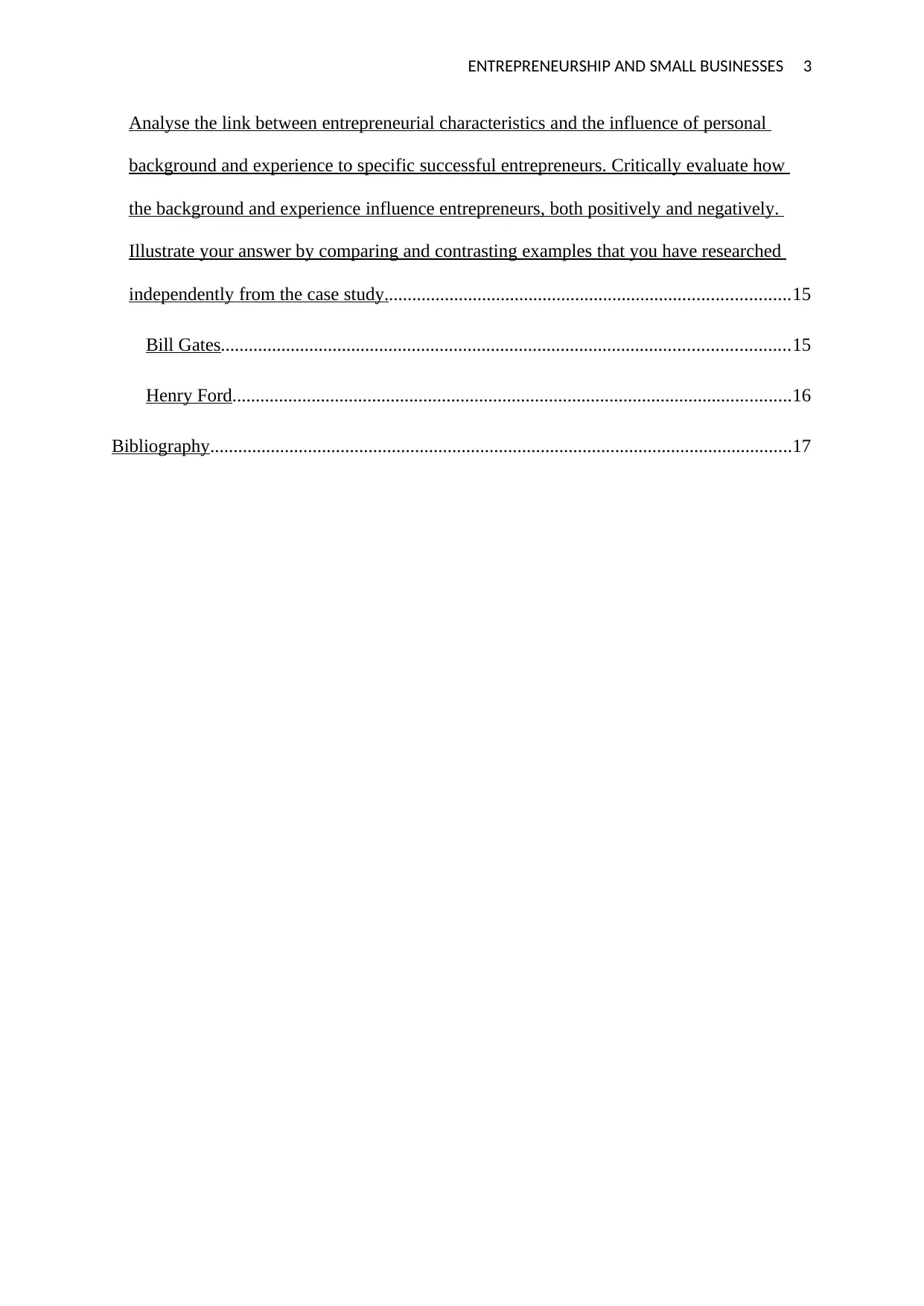
ENTREPRENEURSHIP AND SMALL BUSINESSES 3
Analyse the link between entrepreneurial characteristics and the influence of personal
background and experience to specific successful entrepreneurs. Critically evaluate how
the background and experience influence entrepreneurs, both positively and negatively.
Illustrate your answer by comparing and contrasting examples that you have researched
independently from the case study.......................................................................................15
Bill Gates..........................................................................................................................15
Henry Ford........................................................................................................................16
Bibliography.............................................................................................................................17
Analyse the link between entrepreneurial characteristics and the influence of personal
background and experience to specific successful entrepreneurs. Critically evaluate how
the background and experience influence entrepreneurs, both positively and negatively.
Illustrate your answer by comparing and contrasting examples that you have researched
independently from the case study.......................................................................................15
Bill Gates..........................................................................................................................15
Henry Ford........................................................................................................................16
Bibliography.............................................................................................................................17
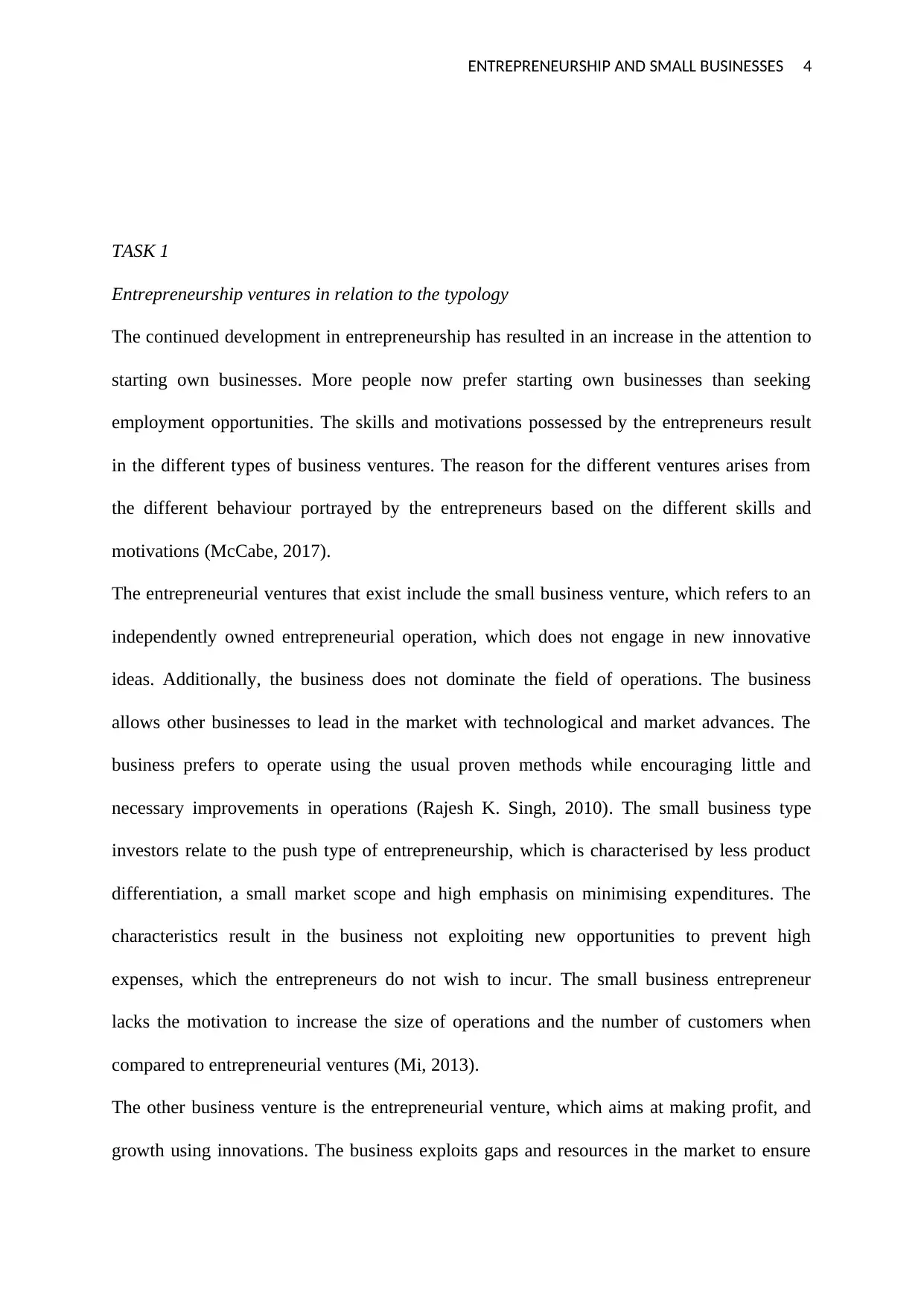
ENTREPRENEURSHIP AND SMALL BUSINESSES 4
TASK 1
Entrepreneurship ventures in relation to the typology
The continued development in entrepreneurship has resulted in an increase in the attention to
starting own businesses. More people now prefer starting own businesses than seeking
employment opportunities. The skills and motivations possessed by the entrepreneurs result
in the different types of business ventures. The reason for the different ventures arises from
the different behaviour portrayed by the entrepreneurs based on the different skills and
motivations (McCabe, 2017).
The entrepreneurial ventures that exist include the small business venture, which refers to an
independently owned entrepreneurial operation, which does not engage in new innovative
ideas. Additionally, the business does not dominate the field of operations. The business
allows other businesses to lead in the market with technological and market advances. The
business prefers to operate using the usual proven methods while encouraging little and
necessary improvements in operations (Rajesh K. Singh, 2010). The small business type
investors relate to the push type of entrepreneurship, which is characterised by less product
differentiation, a small market scope and high emphasis on minimising expenditures. The
characteristics result in the business not exploiting new opportunities to prevent high
expenses, which the entrepreneurs do not wish to incur. The small business entrepreneur
lacks the motivation to increase the size of operations and the number of customers when
compared to entrepreneurial ventures (Mi, 2013).
The other business venture is the entrepreneurial venture, which aims at making profit, and
growth using innovations. The business exploits gaps and resources in the market to ensure
TASK 1
Entrepreneurship ventures in relation to the typology
The continued development in entrepreneurship has resulted in an increase in the attention to
starting own businesses. More people now prefer starting own businesses than seeking
employment opportunities. The skills and motivations possessed by the entrepreneurs result
in the different types of business ventures. The reason for the different ventures arises from
the different behaviour portrayed by the entrepreneurs based on the different skills and
motivations (McCabe, 2017).
The entrepreneurial ventures that exist include the small business venture, which refers to an
independently owned entrepreneurial operation, which does not engage in new innovative
ideas. Additionally, the business does not dominate the field of operations. The business
allows other businesses to lead in the market with technological and market advances. The
business prefers to operate using the usual proven methods while encouraging little and
necessary improvements in operations (Rajesh K. Singh, 2010). The small business type
investors relate to the push type of entrepreneurship, which is characterised by less product
differentiation, a small market scope and high emphasis on minimising expenditures. The
characteristics result in the business not exploiting new opportunities to prevent high
expenses, which the entrepreneurs do not wish to incur. The small business entrepreneur
lacks the motivation to increase the size of operations and the number of customers when
compared to entrepreneurial ventures (Mi, 2013).
The other business venture is the entrepreneurial venture, which aims at making profit, and
growth using innovations. The business exploits gaps and resources in the market to ensure
Secure Best Marks with AI Grader
Need help grading? Try our AI Grader for instant feedback on your assignments.
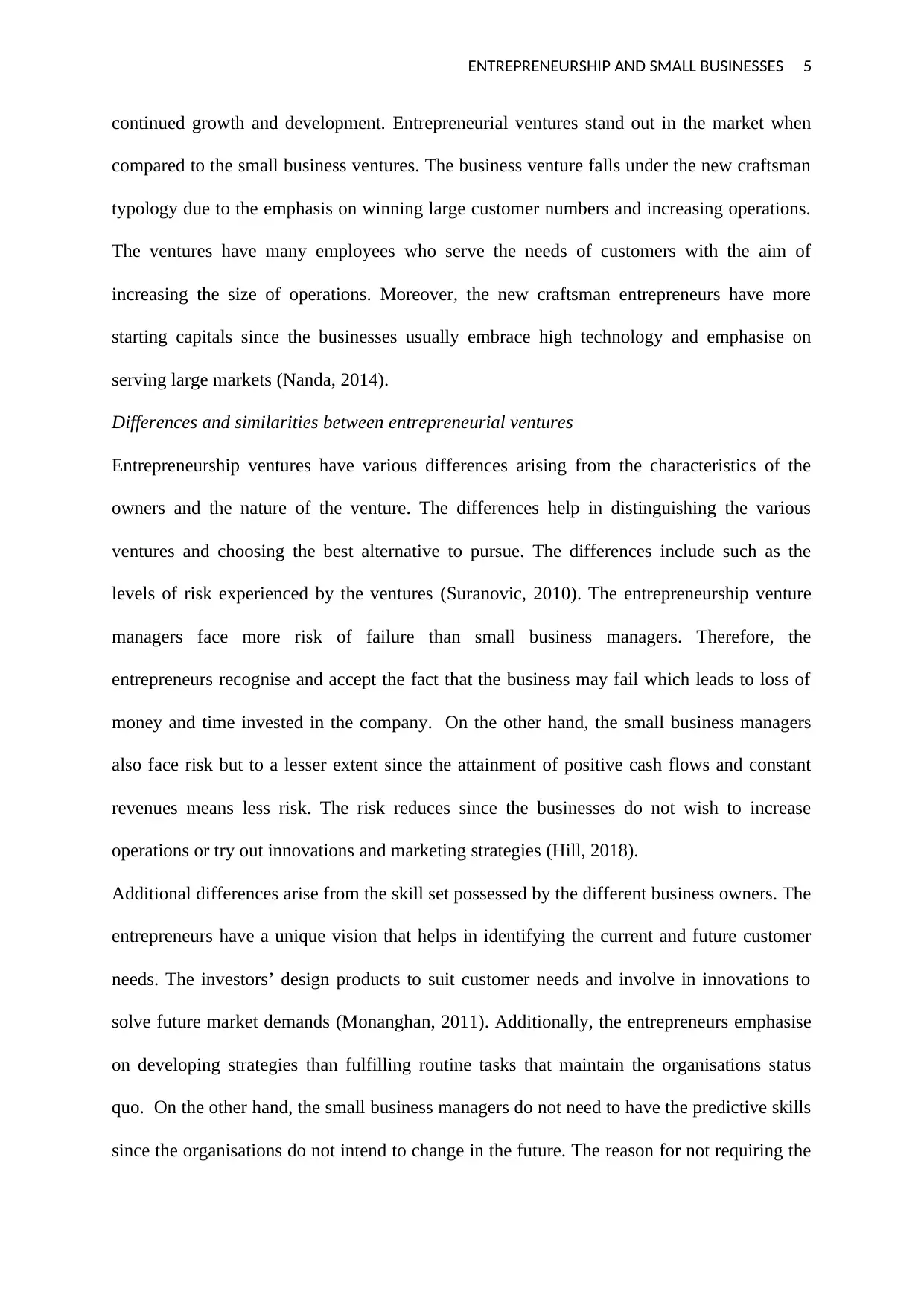
ENTREPRENEURSHIP AND SMALL BUSINESSES 5
continued growth and development. Entrepreneurial ventures stand out in the market when
compared to the small business ventures. The business venture falls under the new craftsman
typology due to the emphasis on winning large customer numbers and increasing operations.
The ventures have many employees who serve the needs of customers with the aim of
increasing the size of operations. Moreover, the new craftsman entrepreneurs have more
starting capitals since the businesses usually embrace high technology and emphasise on
serving large markets (Nanda, 2014).
Differences and similarities between entrepreneurial ventures
Entrepreneurship ventures have various differences arising from the characteristics of the
owners and the nature of the venture. The differences help in distinguishing the various
ventures and choosing the best alternative to pursue. The differences include such as the
levels of risk experienced by the ventures (Suranovic, 2010). The entrepreneurship venture
managers face more risk of failure than small business managers. Therefore, the
entrepreneurs recognise and accept the fact that the business may fail which leads to loss of
money and time invested in the company. On the other hand, the small business managers
also face risk but to a lesser extent since the attainment of positive cash flows and constant
revenues means less risk. The risk reduces since the businesses do not wish to increase
operations or try out innovations and marketing strategies (Hill, 2018).
Additional differences arise from the skill set possessed by the different business owners. The
entrepreneurs have a unique vision that helps in identifying the current and future customer
needs. The investors’ design products to suit customer needs and involve in innovations to
solve future market demands (Monanghan, 2011). Additionally, the entrepreneurs emphasise
on developing strategies than fulfilling routine tasks that maintain the organisations status
quo. On the other hand, the small business managers do not need to have the predictive skills
since the organisations do not intend to change in the future. The reason for not requiring the
continued growth and development. Entrepreneurial ventures stand out in the market when
compared to the small business ventures. The business venture falls under the new craftsman
typology due to the emphasis on winning large customer numbers and increasing operations.
The ventures have many employees who serve the needs of customers with the aim of
increasing the size of operations. Moreover, the new craftsman entrepreneurs have more
starting capitals since the businesses usually embrace high technology and emphasise on
serving large markets (Nanda, 2014).
Differences and similarities between entrepreneurial ventures
Entrepreneurship ventures have various differences arising from the characteristics of the
owners and the nature of the venture. The differences help in distinguishing the various
ventures and choosing the best alternative to pursue. The differences include such as the
levels of risk experienced by the ventures (Suranovic, 2010). The entrepreneurship venture
managers face more risk of failure than small business managers. Therefore, the
entrepreneurs recognise and accept the fact that the business may fail which leads to loss of
money and time invested in the company. On the other hand, the small business managers
also face risk but to a lesser extent since the attainment of positive cash flows and constant
revenues means less risk. The risk reduces since the businesses do not wish to increase
operations or try out innovations and marketing strategies (Hill, 2018).
Additional differences arise from the skill set possessed by the different business owners. The
entrepreneurs have a unique vision that helps in identifying the current and future customer
needs. The investors’ design products to suit customer needs and involve in innovations to
solve future market demands (Monanghan, 2011). Additionally, the entrepreneurs emphasise
on developing strategies than fulfilling routine tasks that maintain the organisations status
quo. On the other hand, the small business managers do not need to have the predictive skills
since the organisations do not intend to change in the future. The reason for not requiring the
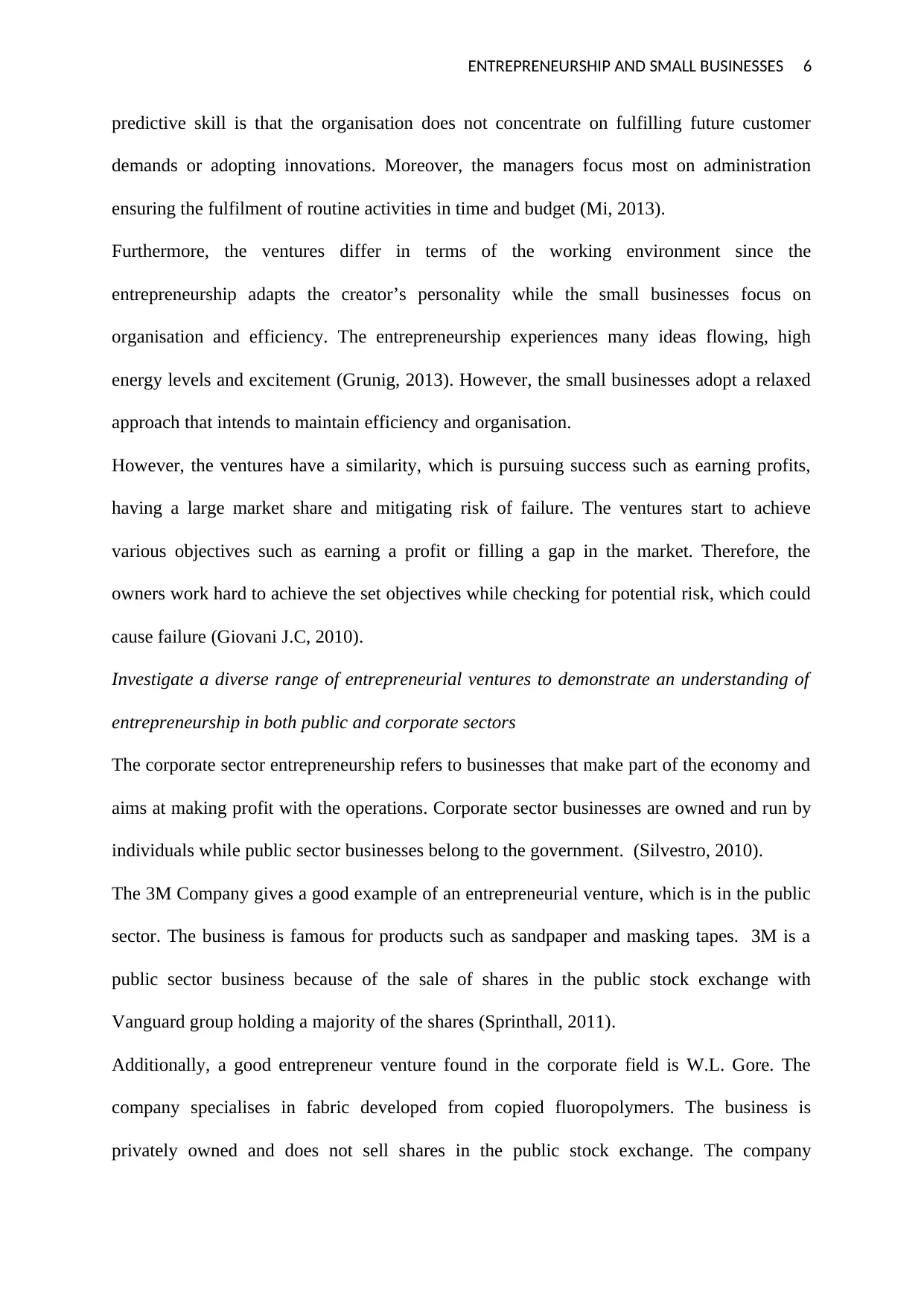
ENTREPRENEURSHIP AND SMALL BUSINESSES 6
predictive skill is that the organisation does not concentrate on fulfilling future customer
demands or adopting innovations. Moreover, the managers focus most on administration
ensuring the fulfilment of routine activities in time and budget (Mi, 2013).
Furthermore, the ventures differ in terms of the working environment since the
entrepreneurship adapts the creator’s personality while the small businesses focus on
organisation and efficiency. The entrepreneurship experiences many ideas flowing, high
energy levels and excitement (Grunig, 2013). However, the small businesses adopt a relaxed
approach that intends to maintain efficiency and organisation.
However, the ventures have a similarity, which is pursuing success such as earning profits,
having a large market share and mitigating risk of failure. The ventures start to achieve
various objectives such as earning a profit or filling a gap in the market. Therefore, the
owners work hard to achieve the set objectives while checking for potential risk, which could
cause failure (Giovani J.C, 2010).
Investigate a diverse range of entrepreneurial ventures to demonstrate an understanding of
entrepreneurship in both public and corporate sectors
The corporate sector entrepreneurship refers to businesses that make part of the economy and
aims at making profit with the operations. Corporate sector businesses are owned and run by
individuals while public sector businesses belong to the government. (Silvestro, 2010).
The 3M Company gives a good example of an entrepreneurial venture, which is in the public
sector. The business is famous for products such as sandpaper and masking tapes. 3M is a
public sector business because of the sale of shares in the public stock exchange with
Vanguard group holding a majority of the shares (Sprinthall, 2011).
Additionally, a good entrepreneur venture found in the corporate field is W.L. Gore. The
company specialises in fabric developed from copied fluoropolymers. The business is
privately owned and does not sell shares in the public stock exchange. The company
predictive skill is that the organisation does not concentrate on fulfilling future customer
demands or adopting innovations. Moreover, the managers focus most on administration
ensuring the fulfilment of routine activities in time and budget (Mi, 2013).
Furthermore, the ventures differ in terms of the working environment since the
entrepreneurship adapts the creator’s personality while the small businesses focus on
organisation and efficiency. The entrepreneurship experiences many ideas flowing, high
energy levels and excitement (Grunig, 2013). However, the small businesses adopt a relaxed
approach that intends to maintain efficiency and organisation.
However, the ventures have a similarity, which is pursuing success such as earning profits,
having a large market share and mitigating risk of failure. The ventures start to achieve
various objectives such as earning a profit or filling a gap in the market. Therefore, the
owners work hard to achieve the set objectives while checking for potential risk, which could
cause failure (Giovani J.C, 2010).
Investigate a diverse range of entrepreneurial ventures to demonstrate an understanding of
entrepreneurship in both public and corporate sectors
The corporate sector entrepreneurship refers to businesses that make part of the economy and
aims at making profit with the operations. Corporate sector businesses are owned and run by
individuals while public sector businesses belong to the government. (Silvestro, 2010).
The 3M Company gives a good example of an entrepreneurial venture, which is in the public
sector. The business is famous for products such as sandpaper and masking tapes. 3M is a
public sector business because of the sale of shares in the public stock exchange with
Vanguard group holding a majority of the shares (Sprinthall, 2011).
Additionally, a good entrepreneur venture found in the corporate field is W.L. Gore. The
company specialises in fabric developed from copied fluoropolymers. The business is
privately owned and does not sell shares in the public stock exchange. The company
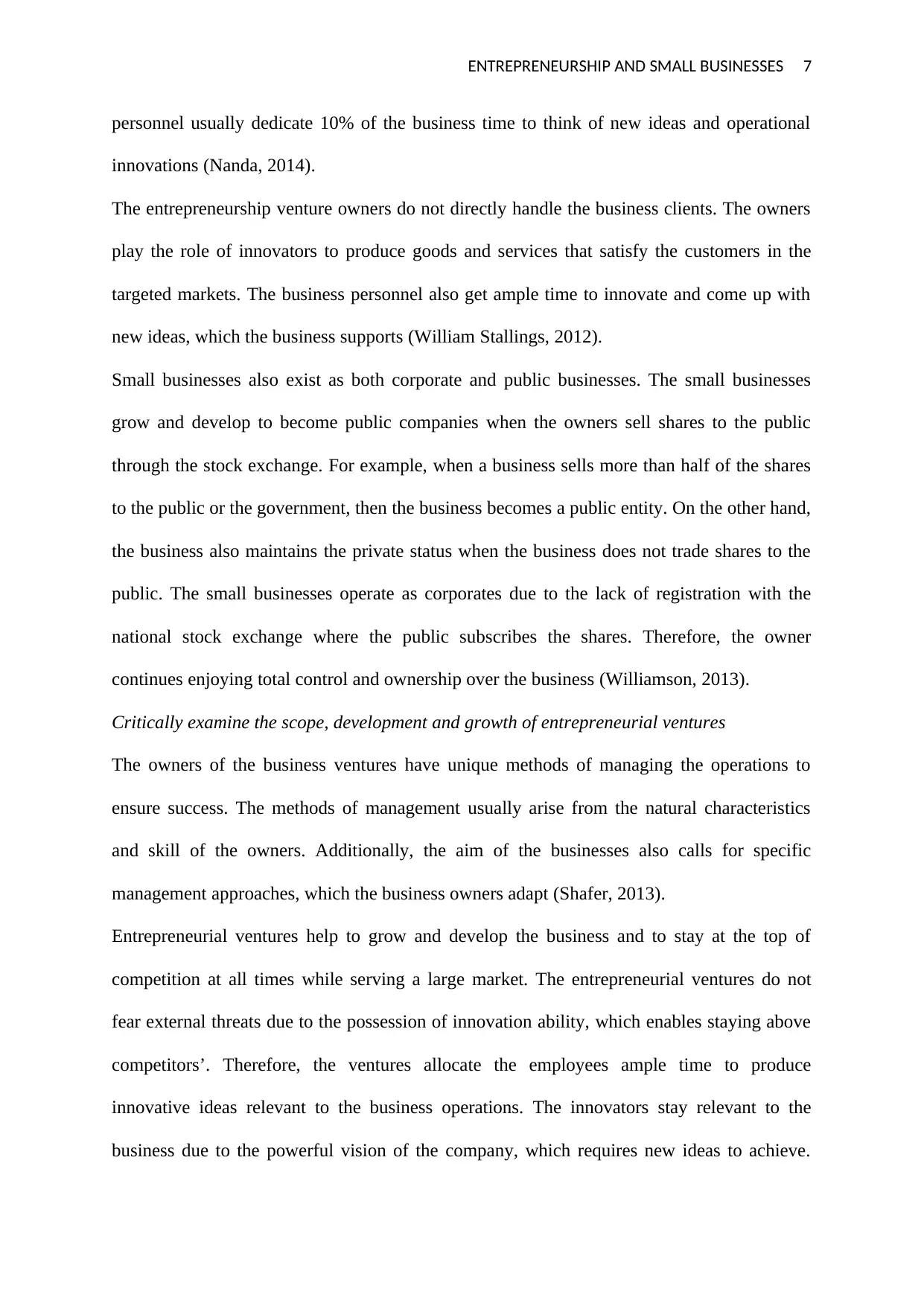
ENTREPRENEURSHIP AND SMALL BUSINESSES 7
personnel usually dedicate 10% of the business time to think of new ideas and operational
innovations (Nanda, 2014).
The entrepreneurship venture owners do not directly handle the business clients. The owners
play the role of innovators to produce goods and services that satisfy the customers in the
targeted markets. The business personnel also get ample time to innovate and come up with
new ideas, which the business supports (William Stallings, 2012).
Small businesses also exist as both corporate and public businesses. The small businesses
grow and develop to become public companies when the owners sell shares to the public
through the stock exchange. For example, when a business sells more than half of the shares
to the public or the government, then the business becomes a public entity. On the other hand,
the business also maintains the private status when the business does not trade shares to the
public. The small businesses operate as corporates due to the lack of registration with the
national stock exchange where the public subscribes the shares. Therefore, the owner
continues enjoying total control and ownership over the business (Williamson, 2013).
Critically examine the scope, development and growth of entrepreneurial ventures
The owners of the business ventures have unique methods of managing the operations to
ensure success. The methods of management usually arise from the natural characteristics
and skill of the owners. Additionally, the aim of the businesses also calls for specific
management approaches, which the business owners adapt (Shafer, 2013).
Entrepreneurial ventures help to grow and develop the business and to stay at the top of
competition at all times while serving a large market. The entrepreneurial ventures do not
fear external threats due to the possession of innovation ability, which enables staying above
competitors’. Therefore, the ventures allocate the employees ample time to produce
innovative ideas relevant to the business operations. The innovators stay relevant to the
business due to the powerful vision of the company, which requires new ideas to achieve.
personnel usually dedicate 10% of the business time to think of new ideas and operational
innovations (Nanda, 2014).
The entrepreneurship venture owners do not directly handle the business clients. The owners
play the role of innovators to produce goods and services that satisfy the customers in the
targeted markets. The business personnel also get ample time to innovate and come up with
new ideas, which the business supports (William Stallings, 2012).
Small businesses also exist as both corporate and public businesses. The small businesses
grow and develop to become public companies when the owners sell shares to the public
through the stock exchange. For example, when a business sells more than half of the shares
to the public or the government, then the business becomes a public entity. On the other hand,
the business also maintains the private status when the business does not trade shares to the
public. The small businesses operate as corporates due to the lack of registration with the
national stock exchange where the public subscribes the shares. Therefore, the owner
continues enjoying total control and ownership over the business (Williamson, 2013).
Critically examine the scope, development and growth of entrepreneurial ventures
The owners of the business ventures have unique methods of managing the operations to
ensure success. The methods of management usually arise from the natural characteristics
and skill of the owners. Additionally, the aim of the businesses also calls for specific
management approaches, which the business owners adapt (Shafer, 2013).
Entrepreneurial ventures help to grow and develop the business and to stay at the top of
competition at all times while serving a large market. The entrepreneurial ventures do not
fear external threats due to the possession of innovation ability, which enables staying above
competitors’. Therefore, the ventures allocate the employees ample time to produce
innovative ideas relevant to the business operations. The innovators stay relevant to the
business due to the powerful vision of the company, which requires new ideas to achieve.
Paraphrase This Document
Need a fresh take? Get an instant paraphrase of this document with our AI Paraphraser
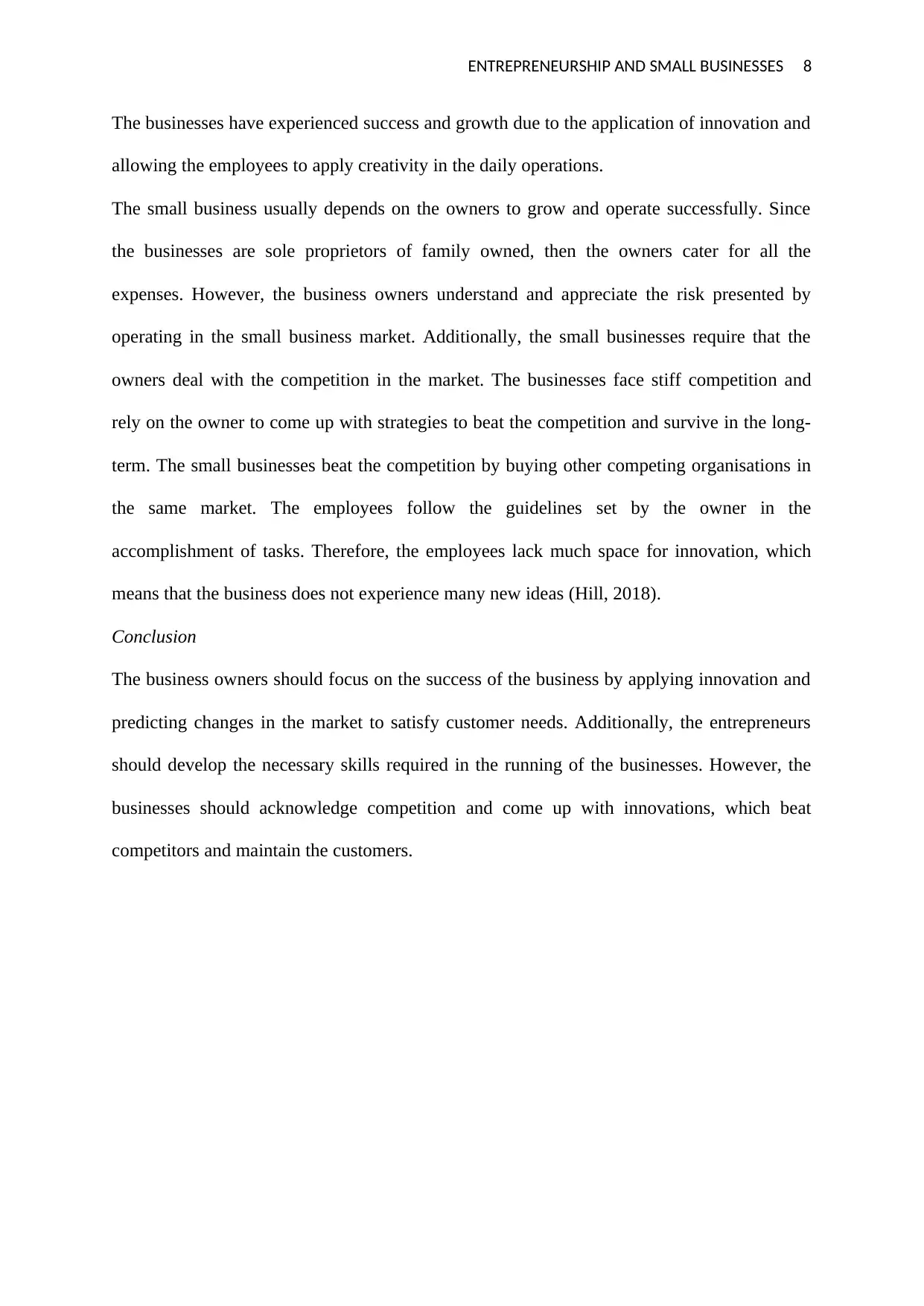
ENTREPRENEURSHIP AND SMALL BUSINESSES 8
The businesses have experienced success and growth due to the application of innovation and
allowing the employees to apply creativity in the daily operations.
The small business usually depends on the owners to grow and operate successfully. Since
the businesses are sole proprietors of family owned, then the owners cater for all the
expenses. However, the business owners understand and appreciate the risk presented by
operating in the small business market. Additionally, the small businesses require that the
owners deal with the competition in the market. The businesses face stiff competition and
rely on the owner to come up with strategies to beat the competition and survive in the long-
term. The small businesses beat the competition by buying other competing organisations in
the same market. The employees follow the guidelines set by the owner in the
accomplishment of tasks. Therefore, the employees lack much space for innovation, which
means that the business does not experience many new ideas (Hill, 2018).
Conclusion
The business owners should focus on the success of the business by applying innovation and
predicting changes in the market to satisfy customer needs. Additionally, the entrepreneurs
should develop the necessary skills required in the running of the businesses. However, the
businesses should acknowledge competition and come up with innovations, which beat
competitors and maintain the customers.
The businesses have experienced success and growth due to the application of innovation and
allowing the employees to apply creativity in the daily operations.
The small business usually depends on the owners to grow and operate successfully. Since
the businesses are sole proprietors of family owned, then the owners cater for all the
expenses. However, the business owners understand and appreciate the risk presented by
operating in the small business market. Additionally, the small businesses require that the
owners deal with the competition in the market. The businesses face stiff competition and
rely on the owner to come up with strategies to beat the competition and survive in the long-
term. The small businesses beat the competition by buying other competing organisations in
the same market. The employees follow the guidelines set by the owner in the
accomplishment of tasks. Therefore, the employees lack much space for innovation, which
means that the business does not experience many new ideas (Hill, 2018).
Conclusion
The business owners should focus on the success of the business by applying innovation and
predicting changes in the market to satisfy customer needs. Additionally, the entrepreneurs
should develop the necessary skills required in the running of the businesses. However, the
businesses should acknowledge competition and come up with innovations, which beat
competitors and maintain the customers.
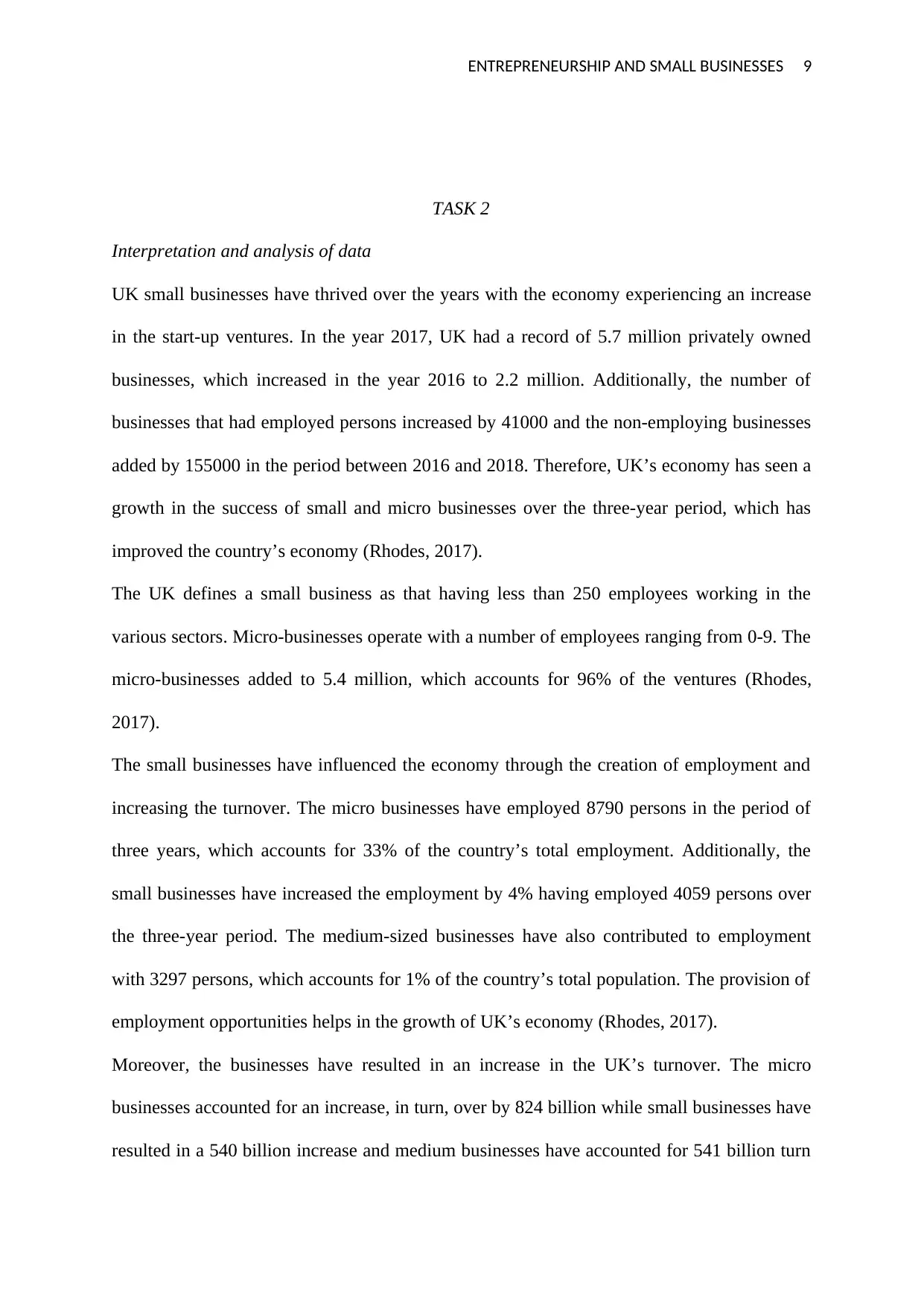
ENTREPRENEURSHIP AND SMALL BUSINESSES 9
TASK 2
Interpretation and analysis of data
UK small businesses have thrived over the years with the economy experiencing an increase
in the start-up ventures. In the year 2017, UK had a record of 5.7 million privately owned
businesses, which increased in the year 2016 to 2.2 million. Additionally, the number of
businesses that had employed persons increased by 41000 and the non-employing businesses
added by 155000 in the period between 2016 and 2018. Therefore, UK’s economy has seen a
growth in the success of small and micro businesses over the three-year period, which has
improved the country’s economy (Rhodes, 2017).
The UK defines a small business as that having less than 250 employees working in the
various sectors. Micro-businesses operate with a number of employees ranging from 0-9. The
micro-businesses added to 5.4 million, which accounts for 96% of the ventures (Rhodes,
2017).
The small businesses have influenced the economy through the creation of employment and
increasing the turnover. The micro businesses have employed 8790 persons in the period of
three years, which accounts for 33% of the country’s total employment. Additionally, the
small businesses have increased the employment by 4% having employed 4059 persons over
the three-year period. The medium-sized businesses have also contributed to employment
with 3297 persons, which accounts for 1% of the country’s total population. The provision of
employment opportunities helps in the growth of UK’s economy (Rhodes, 2017).
Moreover, the businesses have resulted in an increase in the UK’s turnover. The micro
businesses accounted for an increase, in turn, over by 824 billion while small businesses have
resulted in a 540 billion increase and medium businesses have accounted for 541 billion turn
TASK 2
Interpretation and analysis of data
UK small businesses have thrived over the years with the economy experiencing an increase
in the start-up ventures. In the year 2017, UK had a record of 5.7 million privately owned
businesses, which increased in the year 2016 to 2.2 million. Additionally, the number of
businesses that had employed persons increased by 41000 and the non-employing businesses
added by 155000 in the period between 2016 and 2018. Therefore, UK’s economy has seen a
growth in the success of small and micro businesses over the three-year period, which has
improved the country’s economy (Rhodes, 2017).
The UK defines a small business as that having less than 250 employees working in the
various sectors. Micro-businesses operate with a number of employees ranging from 0-9. The
micro-businesses added to 5.4 million, which accounts for 96% of the ventures (Rhodes,
2017).
The small businesses have influenced the economy through the creation of employment and
increasing the turnover. The micro businesses have employed 8790 persons in the period of
three years, which accounts for 33% of the country’s total employment. Additionally, the
small businesses have increased the employment by 4% having employed 4059 persons over
the three-year period. The medium-sized businesses have also contributed to employment
with 3297 persons, which accounts for 1% of the country’s total population. The provision of
employment opportunities helps in the growth of UK’s economy (Rhodes, 2017).
Moreover, the businesses have resulted in an increase in the UK’s turnover. The micro
businesses accounted for an increase, in turn, over by 824 billion while small businesses have
resulted in a 540 billion increase and medium businesses have accounted for 541 billion turn
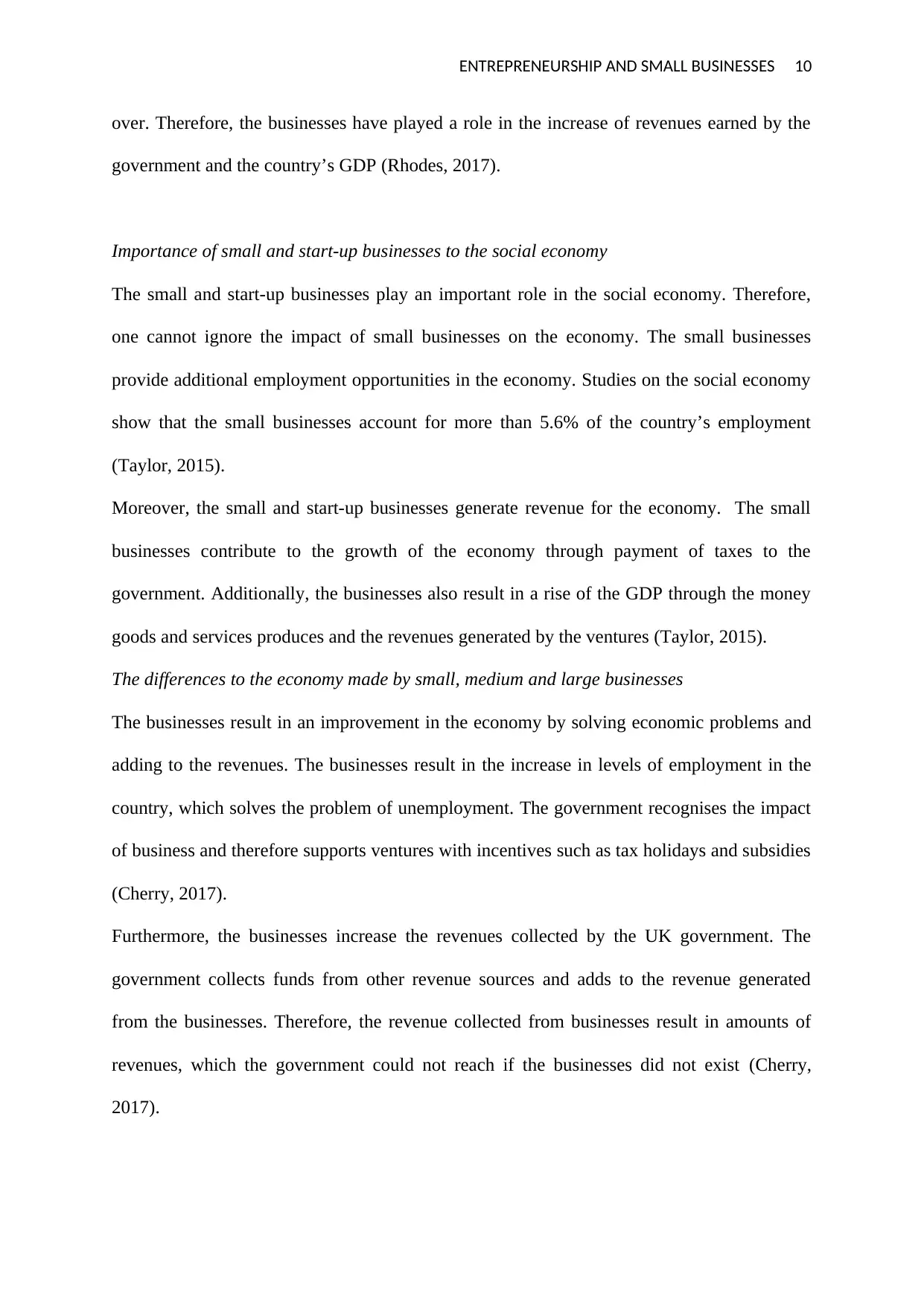
ENTREPRENEURSHIP AND SMALL BUSINESSES 10
over. Therefore, the businesses have played a role in the increase of revenues earned by the
government and the country’s GDP (Rhodes, 2017).
Importance of small and start-up businesses to the social economy
The small and start-up businesses play an important role in the social economy. Therefore,
one cannot ignore the impact of small businesses on the economy. The small businesses
provide additional employment opportunities in the economy. Studies on the social economy
show that the small businesses account for more than 5.6% of the country’s employment
(Taylor, 2015).
Moreover, the small and start-up businesses generate revenue for the economy. The small
businesses contribute to the growth of the economy through payment of taxes to the
government. Additionally, the businesses also result in a rise of the GDP through the money
goods and services produces and the revenues generated by the ventures (Taylor, 2015).
The differences to the economy made by small, medium and large businesses
The businesses result in an improvement in the economy by solving economic problems and
adding to the revenues. The businesses result in the increase in levels of employment in the
country, which solves the problem of unemployment. The government recognises the impact
of business and therefore supports ventures with incentives such as tax holidays and subsidies
(Cherry, 2017).
Furthermore, the businesses increase the revenues collected by the UK government. The
government collects funds from other revenue sources and adds to the revenue generated
from the businesses. Therefore, the revenue collected from businesses result in amounts of
revenues, which the government could not reach if the businesses did not exist (Cherry,
2017).
over. Therefore, the businesses have played a role in the increase of revenues earned by the
government and the country’s GDP (Rhodes, 2017).
Importance of small and start-up businesses to the social economy
The small and start-up businesses play an important role in the social economy. Therefore,
one cannot ignore the impact of small businesses on the economy. The small businesses
provide additional employment opportunities in the economy. Studies on the social economy
show that the small businesses account for more than 5.6% of the country’s employment
(Taylor, 2015).
Moreover, the small and start-up businesses generate revenue for the economy. The small
businesses contribute to the growth of the economy through payment of taxes to the
government. Additionally, the businesses also result in a rise of the GDP through the money
goods and services produces and the revenues generated by the ventures (Taylor, 2015).
The differences to the economy made by small, medium and large businesses
The businesses result in an improvement in the economy by solving economic problems and
adding to the revenues. The businesses result in the increase in levels of employment in the
country, which solves the problem of unemployment. The government recognises the impact
of business and therefore supports ventures with incentives such as tax holidays and subsidies
(Cherry, 2017).
Furthermore, the businesses increase the revenues collected by the UK government. The
government collects funds from other revenue sources and adds to the revenue generated
from the businesses. Therefore, the revenue collected from businesses result in amounts of
revenues, which the government could not reach if the businesses did not exist (Cherry,
2017).
Secure Best Marks with AI Grader
Need help grading? Try our AI Grader for instant feedback on your assignments.
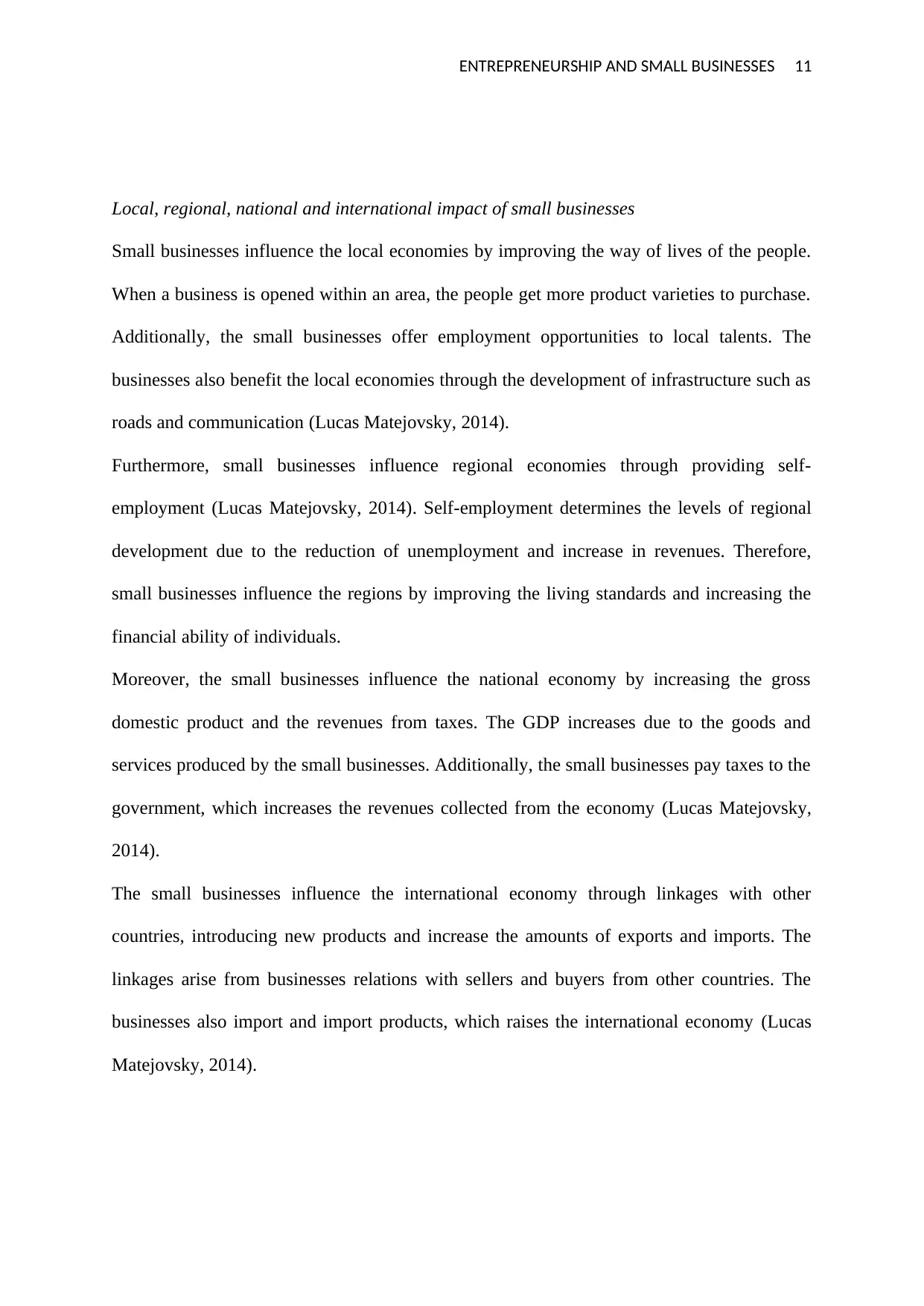
ENTREPRENEURSHIP AND SMALL BUSINESSES 11
Local, regional, national and international impact of small businesses
Small businesses influence the local economies by improving the way of lives of the people.
When a business is opened within an area, the people get more product varieties to purchase.
Additionally, the small businesses offer employment opportunities to local talents. The
businesses also benefit the local economies through the development of infrastructure such as
roads and communication (Lucas Matejovsky, 2014).
Furthermore, small businesses influence regional economies through providing self-
employment (Lucas Matejovsky, 2014). Self-employment determines the levels of regional
development due to the reduction of unemployment and increase in revenues. Therefore,
small businesses influence the regions by improving the living standards and increasing the
financial ability of individuals.
Moreover, the small businesses influence the national economy by increasing the gross
domestic product and the revenues from taxes. The GDP increases due to the goods and
services produced by the small businesses. Additionally, the small businesses pay taxes to the
government, which increases the revenues collected from the economy (Lucas Matejovsky,
2014).
The small businesses influence the international economy through linkages with other
countries, introducing new products and increase the amounts of exports and imports. The
linkages arise from businesses relations with sellers and buyers from other countries. The
businesses also import and import products, which raises the international economy (Lucas
Matejovsky, 2014).
Local, regional, national and international impact of small businesses
Small businesses influence the local economies by improving the way of lives of the people.
When a business is opened within an area, the people get more product varieties to purchase.
Additionally, the small businesses offer employment opportunities to local talents. The
businesses also benefit the local economies through the development of infrastructure such as
roads and communication (Lucas Matejovsky, 2014).
Furthermore, small businesses influence regional economies through providing self-
employment (Lucas Matejovsky, 2014). Self-employment determines the levels of regional
development due to the reduction of unemployment and increase in revenues. Therefore,
small businesses influence the regions by improving the living standards and increasing the
financial ability of individuals.
Moreover, the small businesses influence the national economy by increasing the gross
domestic product and the revenues from taxes. The GDP increases due to the goods and
services produced by the small businesses. Additionally, the small businesses pay taxes to the
government, which increases the revenues collected from the economy (Lucas Matejovsky,
2014).
The small businesses influence the international economy through linkages with other
countries, introducing new products and increase the amounts of exports and imports. The
linkages arise from businesses relations with sellers and buyers from other countries. The
businesses also import and import products, which raises the international economy (Lucas
Matejovsky, 2014).
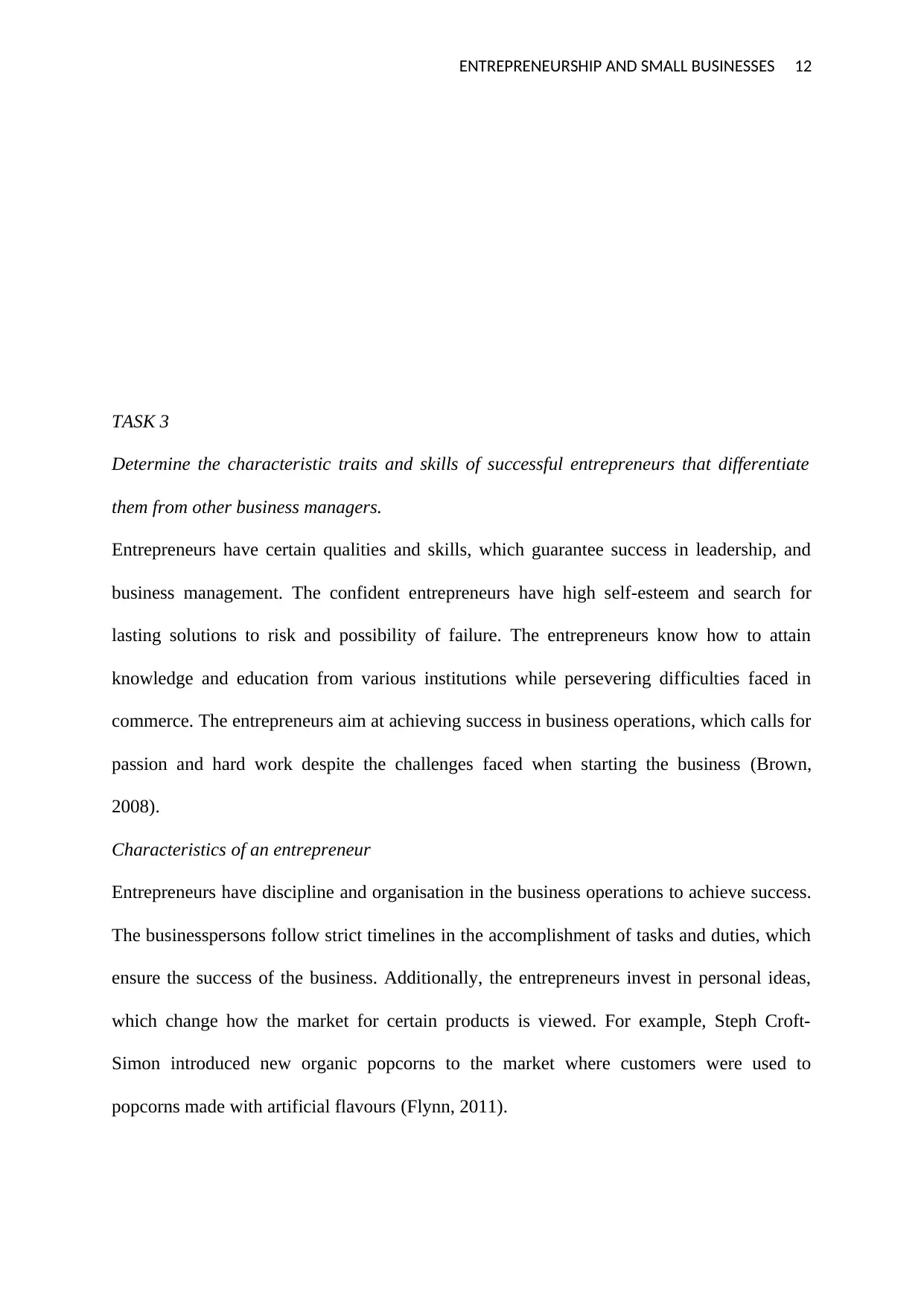
ENTREPRENEURSHIP AND SMALL BUSINESSES 12
TASK 3
Determine the characteristic traits and skills of successful entrepreneurs that differentiate
them from other business managers.
Entrepreneurs have certain qualities and skills, which guarantee success in leadership, and
business management. The confident entrepreneurs have high self-esteem and search for
lasting solutions to risk and possibility of failure. The entrepreneurs know how to attain
knowledge and education from various institutions while persevering difficulties faced in
commerce. The entrepreneurs aim at achieving success in business operations, which calls for
passion and hard work despite the challenges faced when starting the business (Brown,
2008).
Characteristics of an entrepreneur
Entrepreneurs have discipline and organisation in the business operations to achieve success.
The businesspersons follow strict timelines in the accomplishment of tasks and duties, which
ensure the success of the business. Additionally, the entrepreneurs invest in personal ideas,
which change how the market for certain products is viewed. For example, Steph Croft-
Simon introduced new organic popcorns to the market where customers were used to
popcorns made with artificial flavours (Flynn, 2011).
TASK 3
Determine the characteristic traits and skills of successful entrepreneurs that differentiate
them from other business managers.
Entrepreneurs have certain qualities and skills, which guarantee success in leadership, and
business management. The confident entrepreneurs have high self-esteem and search for
lasting solutions to risk and possibility of failure. The entrepreneurs know how to attain
knowledge and education from various institutions while persevering difficulties faced in
commerce. The entrepreneurs aim at achieving success in business operations, which calls for
passion and hard work despite the challenges faced when starting the business (Brown,
2008).
Characteristics of an entrepreneur
Entrepreneurs have discipline and organisation in the business operations to achieve success.
The businesspersons follow strict timelines in the accomplishment of tasks and duties, which
ensure the success of the business. Additionally, the entrepreneurs invest in personal ideas,
which change how the market for certain products is viewed. For example, Steph Croft-
Simon introduced new organic popcorns to the market where customers were used to
popcorns made with artificial flavours (Flynn, 2011).
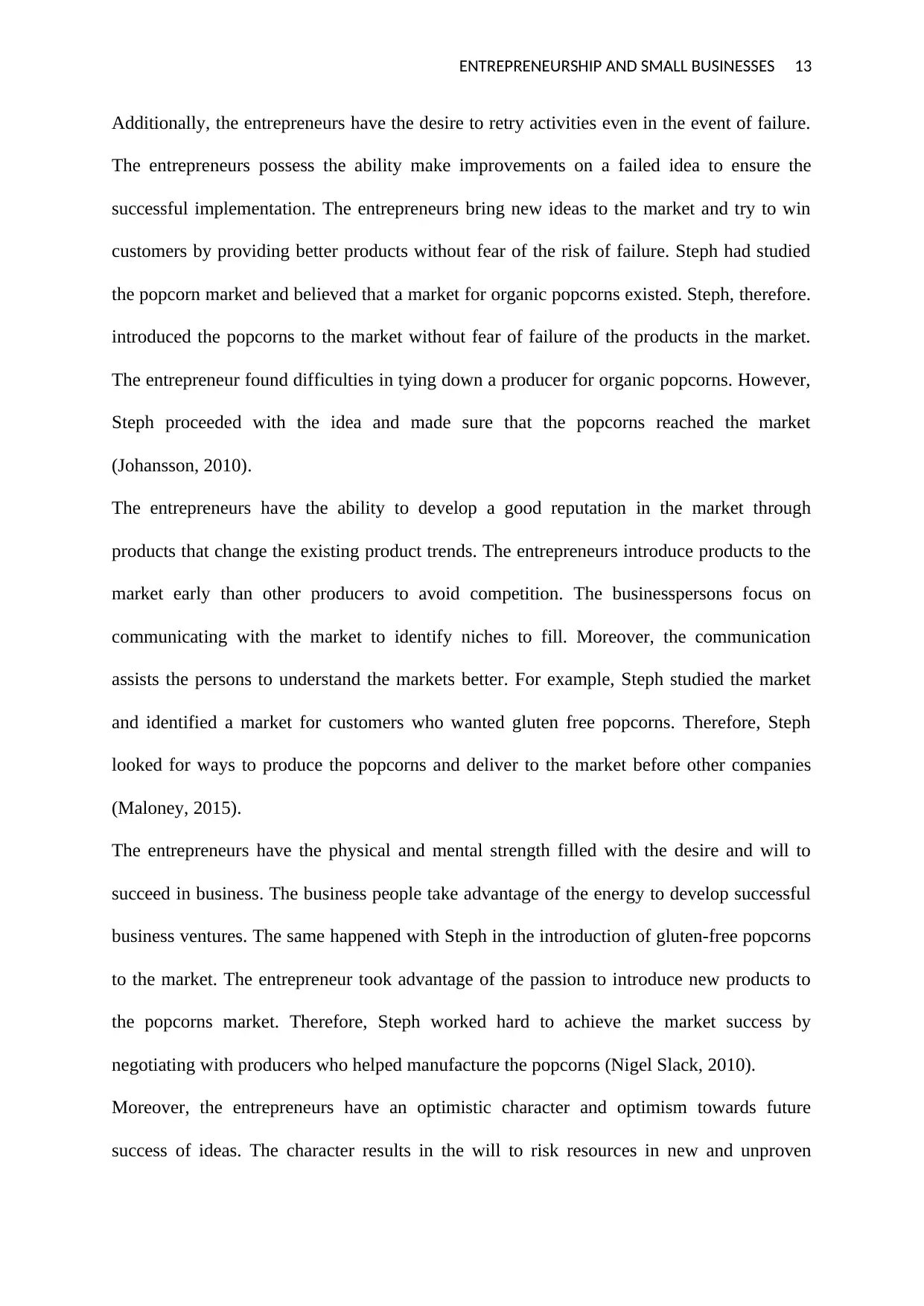
ENTREPRENEURSHIP AND SMALL BUSINESSES 13
Additionally, the entrepreneurs have the desire to retry activities even in the event of failure.
The entrepreneurs possess the ability make improvements on a failed idea to ensure the
successful implementation. The entrepreneurs bring new ideas to the market and try to win
customers by providing better products without fear of the risk of failure. Steph had studied
the popcorn market and believed that a market for organic popcorns existed. Steph, therefore.
introduced the popcorns to the market without fear of failure of the products in the market.
The entrepreneur found difficulties in tying down a producer for organic popcorns. However,
Steph proceeded with the idea and made sure that the popcorns reached the market
(Johansson, 2010).
The entrepreneurs have the ability to develop a good reputation in the market through
products that change the existing product trends. The entrepreneurs introduce products to the
market early than other producers to avoid competition. The businesspersons focus on
communicating with the market to identify niches to fill. Moreover, the communication
assists the persons to understand the markets better. For example, Steph studied the market
and identified a market for customers who wanted gluten free popcorns. Therefore, Steph
looked for ways to produce the popcorns and deliver to the market before other companies
(Maloney, 2015).
The entrepreneurs have the physical and mental strength filled with the desire and will to
succeed in business. The business people take advantage of the energy to develop successful
business ventures. The same happened with Steph in the introduction of gluten-free popcorns
to the market. The entrepreneur took advantage of the passion to introduce new products to
the popcorns market. Therefore, Steph worked hard to achieve the market success by
negotiating with producers who helped manufacture the popcorns (Nigel Slack, 2010).
Moreover, the entrepreneurs have an optimistic character and optimism towards future
success of ideas. The character results in the will to risk resources in new and unproven
Additionally, the entrepreneurs have the desire to retry activities even in the event of failure.
The entrepreneurs possess the ability make improvements on a failed idea to ensure the
successful implementation. The entrepreneurs bring new ideas to the market and try to win
customers by providing better products without fear of the risk of failure. Steph had studied
the popcorn market and believed that a market for organic popcorns existed. Steph, therefore.
introduced the popcorns to the market without fear of failure of the products in the market.
The entrepreneur found difficulties in tying down a producer for organic popcorns. However,
Steph proceeded with the idea and made sure that the popcorns reached the market
(Johansson, 2010).
The entrepreneurs have the ability to develop a good reputation in the market through
products that change the existing product trends. The entrepreneurs introduce products to the
market early than other producers to avoid competition. The businesspersons focus on
communicating with the market to identify niches to fill. Moreover, the communication
assists the persons to understand the markets better. For example, Steph studied the market
and identified a market for customers who wanted gluten free popcorns. Therefore, Steph
looked for ways to produce the popcorns and deliver to the market before other companies
(Maloney, 2015).
The entrepreneurs have the physical and mental strength filled with the desire and will to
succeed in business. The business people take advantage of the energy to develop successful
business ventures. The same happened with Steph in the introduction of gluten-free popcorns
to the market. The entrepreneur took advantage of the passion to introduce new products to
the popcorns market. Therefore, Steph worked hard to achieve the market success by
negotiating with producers who helped manufacture the popcorns (Nigel Slack, 2010).
Moreover, the entrepreneurs have an optimistic character and optimism towards future
success of ideas. The character results in the will to risk resources in new and unproven
Paraphrase This Document
Need a fresh take? Get an instant paraphrase of this document with our AI Paraphraser
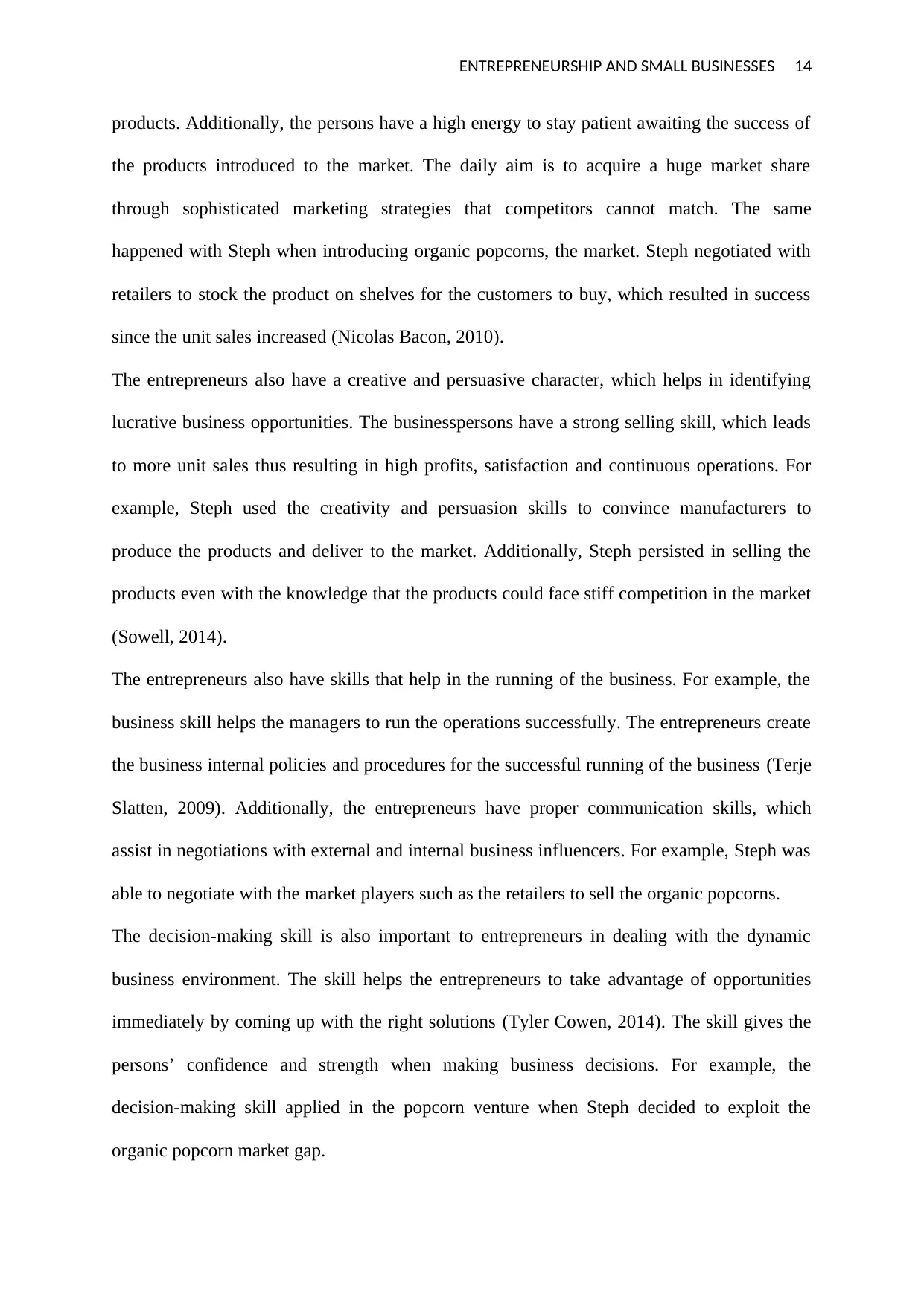
ENTREPRENEURSHIP AND SMALL BUSINESSES 14
products. Additionally, the persons have a high energy to stay patient awaiting the success of
the products introduced to the market. The daily aim is to acquire a huge market share
through sophisticated marketing strategies that competitors cannot match. The same
happened with Steph when introducing organic popcorns, the market. Steph negotiated with
retailers to stock the product on shelves for the customers to buy, which resulted in success
since the unit sales increased (Nicolas Bacon, 2010).
The entrepreneurs also have a creative and persuasive character, which helps in identifying
lucrative business opportunities. The businesspersons have a strong selling skill, which leads
to more unit sales thus resulting in high profits, satisfaction and continuous operations. For
example, Steph used the creativity and persuasion skills to convince manufacturers to
produce the products and deliver to the market. Additionally, Steph persisted in selling the
products even with the knowledge that the products could face stiff competition in the market
(Sowell, 2014).
The entrepreneurs also have skills that help in the running of the business. For example, the
business skill helps the managers to run the operations successfully. The entrepreneurs create
the business internal policies and procedures for the successful running of the business (Terje
Slatten, 2009). Additionally, the entrepreneurs have proper communication skills, which
assist in negotiations with external and internal business influencers. For example, Steph was
able to negotiate with the market players such as the retailers to sell the organic popcorns.
The decision-making skill is also important to entrepreneurs in dealing with the dynamic
business environment. The skill helps the entrepreneurs to take advantage of opportunities
immediately by coming up with the right solutions (Tyler Cowen, 2014). The skill gives the
persons’ confidence and strength when making business decisions. For example, the
decision-making skill applied in the popcorn venture when Steph decided to exploit the
organic popcorn market gap.
products. Additionally, the persons have a high energy to stay patient awaiting the success of
the products introduced to the market. The daily aim is to acquire a huge market share
through sophisticated marketing strategies that competitors cannot match. The same
happened with Steph when introducing organic popcorns, the market. Steph negotiated with
retailers to stock the product on shelves for the customers to buy, which resulted in success
since the unit sales increased (Nicolas Bacon, 2010).
The entrepreneurs also have a creative and persuasive character, which helps in identifying
lucrative business opportunities. The businesspersons have a strong selling skill, which leads
to more unit sales thus resulting in high profits, satisfaction and continuous operations. For
example, Steph used the creativity and persuasion skills to convince manufacturers to
produce the products and deliver to the market. Additionally, Steph persisted in selling the
products even with the knowledge that the products could face stiff competition in the market
(Sowell, 2014).
The entrepreneurs also have skills that help in the running of the business. For example, the
business skill helps the managers to run the operations successfully. The entrepreneurs create
the business internal policies and procedures for the successful running of the business (Terje
Slatten, 2009). Additionally, the entrepreneurs have proper communication skills, which
assist in negotiations with external and internal business influencers. For example, Steph was
able to negotiate with the market players such as the retailers to sell the organic popcorns.
The decision-making skill is also important to entrepreneurs in dealing with the dynamic
business environment. The skill helps the entrepreneurs to take advantage of opportunities
immediately by coming up with the right solutions (Tyler Cowen, 2014). The skill gives the
persons’ confidence and strength when making business decisions. For example, the
decision-making skill applied in the popcorn venture when Steph decided to exploit the
organic popcorn market gap.
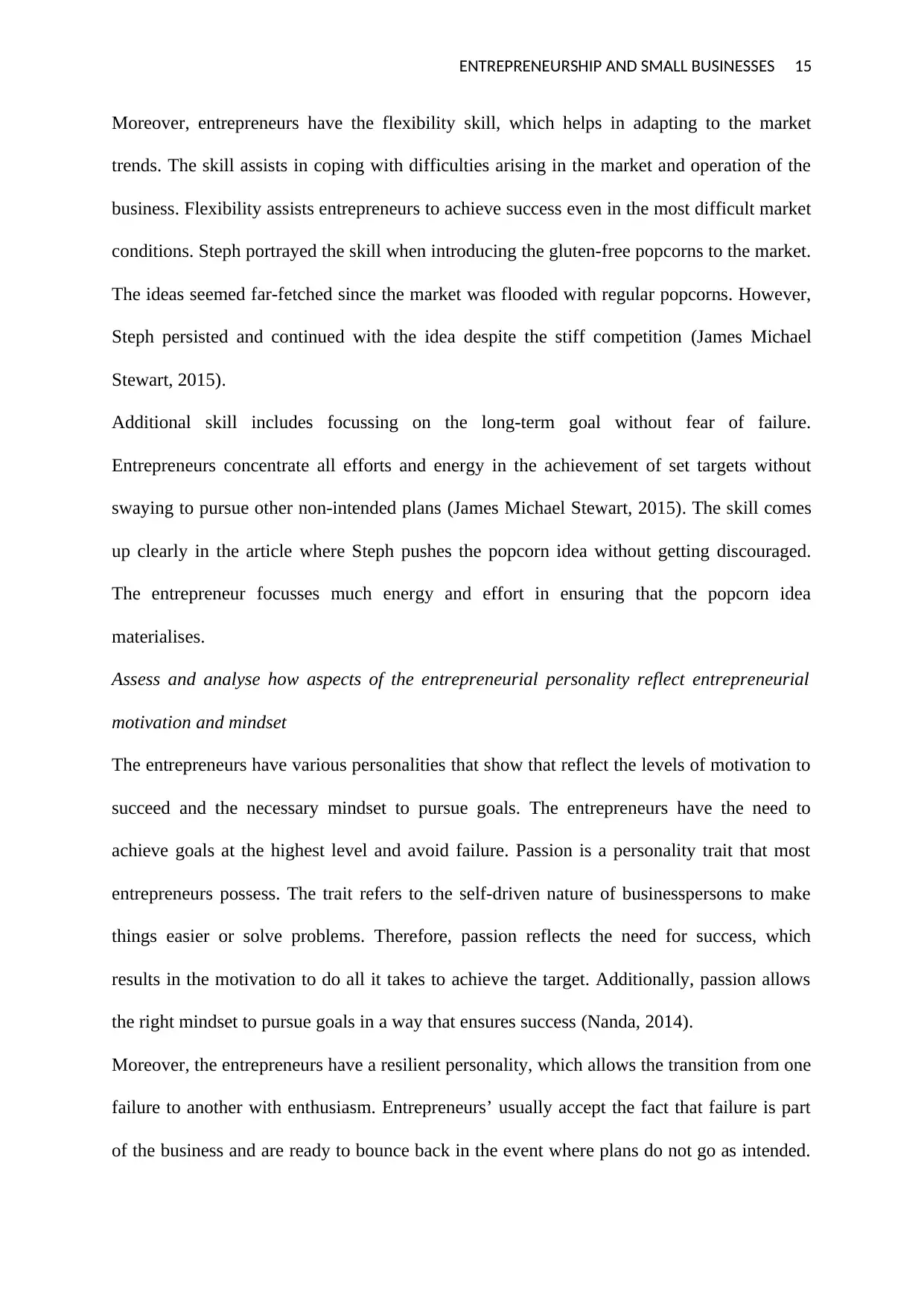
ENTREPRENEURSHIP AND SMALL BUSINESSES 15
Moreover, entrepreneurs have the flexibility skill, which helps in adapting to the market
trends. The skill assists in coping with difficulties arising in the market and operation of the
business. Flexibility assists entrepreneurs to achieve success even in the most difficult market
conditions. Steph portrayed the skill when introducing the gluten-free popcorns to the market.
The ideas seemed far-fetched since the market was flooded with regular popcorns. However,
Steph persisted and continued with the idea despite the stiff competition (James Michael
Stewart, 2015).
Additional skill includes focussing on the long-term goal without fear of failure.
Entrepreneurs concentrate all efforts and energy in the achievement of set targets without
swaying to pursue other non-intended plans (James Michael Stewart, 2015). The skill comes
up clearly in the article where Steph pushes the popcorn idea without getting discouraged.
The entrepreneur focusses much energy and effort in ensuring that the popcorn idea
materialises.
Assess and analyse how aspects of the entrepreneurial personality reflect entrepreneurial
motivation and mindset
The entrepreneurs have various personalities that show that reflect the levels of motivation to
succeed and the necessary mindset to pursue goals. The entrepreneurs have the need to
achieve goals at the highest level and avoid failure. Passion is a personality trait that most
entrepreneurs possess. The trait refers to the self-driven nature of businesspersons to make
things easier or solve problems. Therefore, passion reflects the need for success, which
results in the motivation to do all it takes to achieve the target. Additionally, passion allows
the right mindset to pursue goals in a way that ensures success (Nanda, 2014).
Moreover, the entrepreneurs have a resilient personality, which allows the transition from one
failure to another with enthusiasm. Entrepreneurs’ usually accept the fact that failure is part
of the business and are ready to bounce back in the event where plans do not go as intended.
Moreover, entrepreneurs have the flexibility skill, which helps in adapting to the market
trends. The skill assists in coping with difficulties arising in the market and operation of the
business. Flexibility assists entrepreneurs to achieve success even in the most difficult market
conditions. Steph portrayed the skill when introducing the gluten-free popcorns to the market.
The ideas seemed far-fetched since the market was flooded with regular popcorns. However,
Steph persisted and continued with the idea despite the stiff competition (James Michael
Stewart, 2015).
Additional skill includes focussing on the long-term goal without fear of failure.
Entrepreneurs concentrate all efforts and energy in the achievement of set targets without
swaying to pursue other non-intended plans (James Michael Stewart, 2015). The skill comes
up clearly in the article where Steph pushes the popcorn idea without getting discouraged.
The entrepreneur focusses much energy and effort in ensuring that the popcorn idea
materialises.
Assess and analyse how aspects of the entrepreneurial personality reflect entrepreneurial
motivation and mindset
The entrepreneurs have various personalities that show that reflect the levels of motivation to
succeed and the necessary mindset to pursue goals. The entrepreneurs have the need to
achieve goals at the highest level and avoid failure. Passion is a personality trait that most
entrepreneurs possess. The trait refers to the self-driven nature of businesspersons to make
things easier or solve problems. Therefore, passion reflects the need for success, which
results in the motivation to do all it takes to achieve the target. Additionally, passion allows
the right mindset to pursue goals in a way that ensures success (Nanda, 2014).
Moreover, the entrepreneurs have a resilient personality, which allows the transition from one
failure to another with enthusiasm. Entrepreneurs’ usually accept the fact that failure is part
of the business and are ready to bounce back in the event where plans do not go as intended.
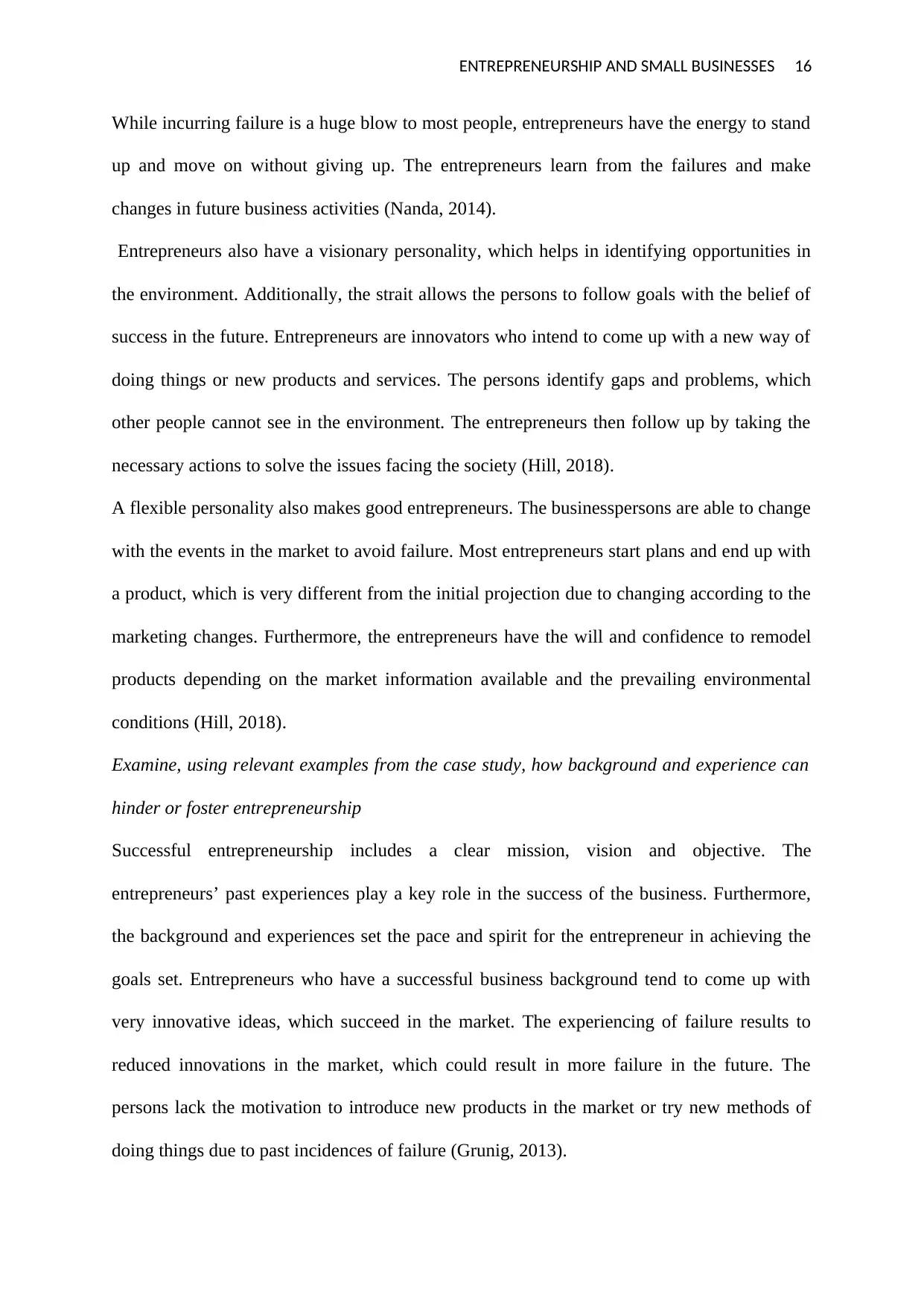
ENTREPRENEURSHIP AND SMALL BUSINESSES 16
While incurring failure is a huge blow to most people, entrepreneurs have the energy to stand
up and move on without giving up. The entrepreneurs learn from the failures and make
changes in future business activities (Nanda, 2014).
Entrepreneurs also have a visionary personality, which helps in identifying opportunities in
the environment. Additionally, the strait allows the persons to follow goals with the belief of
success in the future. Entrepreneurs are innovators who intend to come up with a new way of
doing things or new products and services. The persons identify gaps and problems, which
other people cannot see in the environment. The entrepreneurs then follow up by taking the
necessary actions to solve the issues facing the society (Hill, 2018).
A flexible personality also makes good entrepreneurs. The businesspersons are able to change
with the events in the market to avoid failure. Most entrepreneurs start plans and end up with
a product, which is very different from the initial projection due to changing according to the
marketing changes. Furthermore, the entrepreneurs have the will and confidence to remodel
products depending on the market information available and the prevailing environmental
conditions (Hill, 2018).
Examine, using relevant examples from the case study, how background and experience can
hinder or foster entrepreneurship
Successful entrepreneurship includes a clear mission, vision and objective. The
entrepreneurs’ past experiences play a key role in the success of the business. Furthermore,
the background and experiences set the pace and spirit for the entrepreneur in achieving the
goals set. Entrepreneurs who have a successful business background tend to come up with
very innovative ideas, which succeed in the market. The experiencing of failure results to
reduced innovations in the market, which could result in more failure in the future. The
persons lack the motivation to introduce new products in the market or try new methods of
doing things due to past incidences of failure (Grunig, 2013).
While incurring failure is a huge blow to most people, entrepreneurs have the energy to stand
up and move on without giving up. The entrepreneurs learn from the failures and make
changes in future business activities (Nanda, 2014).
Entrepreneurs also have a visionary personality, which helps in identifying opportunities in
the environment. Additionally, the strait allows the persons to follow goals with the belief of
success in the future. Entrepreneurs are innovators who intend to come up with a new way of
doing things or new products and services. The persons identify gaps and problems, which
other people cannot see in the environment. The entrepreneurs then follow up by taking the
necessary actions to solve the issues facing the society (Hill, 2018).
A flexible personality also makes good entrepreneurs. The businesspersons are able to change
with the events in the market to avoid failure. Most entrepreneurs start plans and end up with
a product, which is very different from the initial projection due to changing according to the
marketing changes. Furthermore, the entrepreneurs have the will and confidence to remodel
products depending on the market information available and the prevailing environmental
conditions (Hill, 2018).
Examine, using relevant examples from the case study, how background and experience can
hinder or foster entrepreneurship
Successful entrepreneurship includes a clear mission, vision and objective. The
entrepreneurs’ past experiences play a key role in the success of the business. Furthermore,
the background and experiences set the pace and spirit for the entrepreneur in achieving the
goals set. Entrepreneurs who have a successful business background tend to come up with
very innovative ideas, which succeed in the market. The experiencing of failure results to
reduced innovations in the market, which could result in more failure in the future. The
persons lack the motivation to introduce new products in the market or try new methods of
doing things due to past incidences of failure (Grunig, 2013).
Secure Best Marks with AI Grader
Need help grading? Try our AI Grader for instant feedback on your assignments.
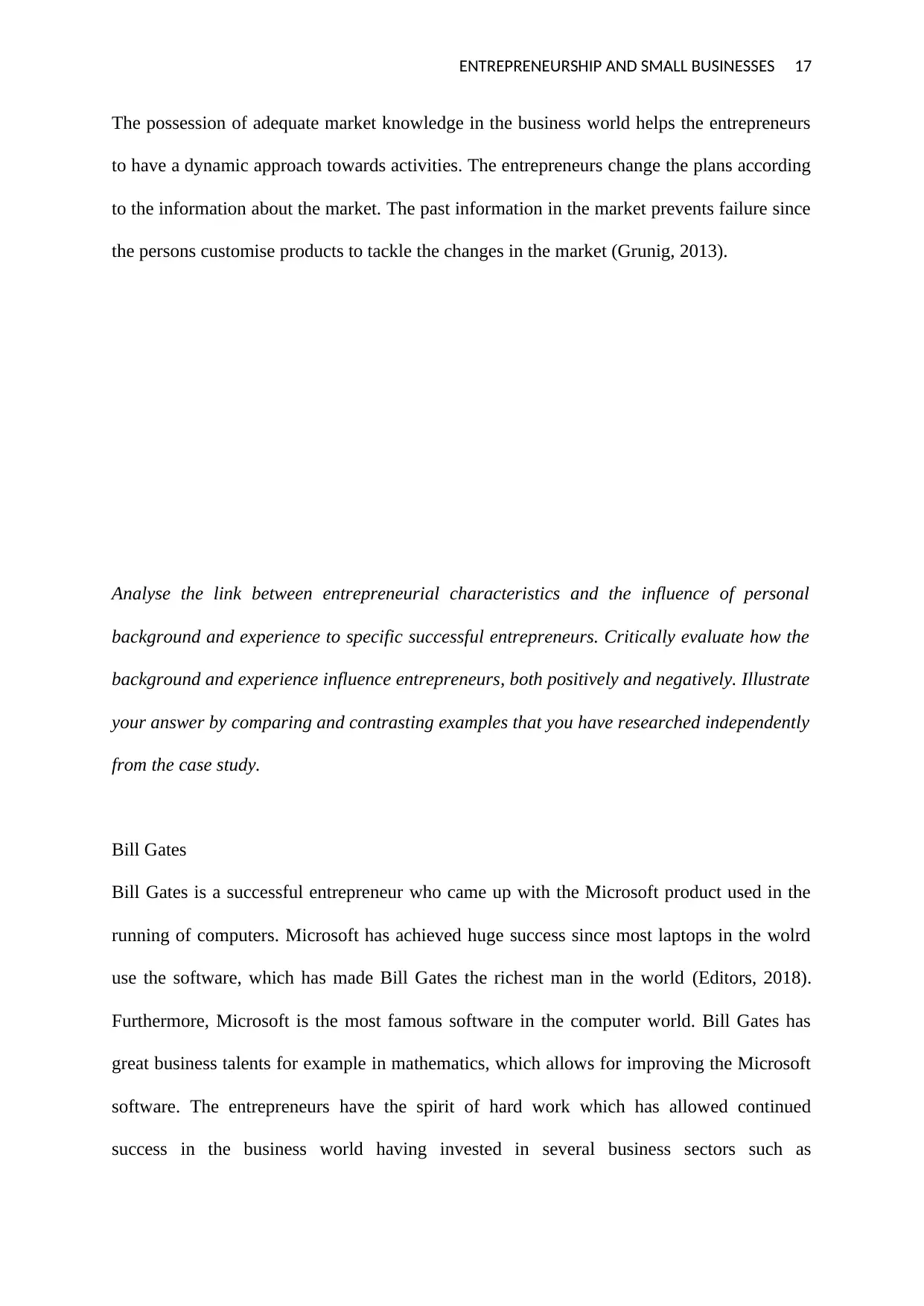
ENTREPRENEURSHIP AND SMALL BUSINESSES 17
The possession of adequate market knowledge in the business world helps the entrepreneurs
to have a dynamic approach towards activities. The entrepreneurs change the plans according
to the information about the market. The past information in the market prevents failure since
the persons customise products to tackle the changes in the market (Grunig, 2013).
Analyse the link between entrepreneurial characteristics and the influence of personal
background and experience to specific successful entrepreneurs. Critically evaluate how the
background and experience influence entrepreneurs, both positively and negatively. Illustrate
your answer by comparing and contrasting examples that you have researched independently
from the case study.
Bill Gates
Bill Gates is a successful entrepreneur who came up with the Microsoft product used in the
running of computers. Microsoft has achieved huge success since most laptops in the wolrd
use the software, which has made Bill Gates the richest man in the world (Editors, 2018).
Furthermore, Microsoft is the most famous software in the computer world. Bill Gates has
great business talents for example in mathematics, which allows for improving the Microsoft
software. The entrepreneurs have the spirit of hard work which has allowed continued
success in the business world having invested in several business sectors such as
The possession of adequate market knowledge in the business world helps the entrepreneurs
to have a dynamic approach towards activities. The entrepreneurs change the plans according
to the information about the market. The past information in the market prevents failure since
the persons customise products to tackle the changes in the market (Grunig, 2013).
Analyse the link between entrepreneurial characteristics and the influence of personal
background and experience to specific successful entrepreneurs. Critically evaluate how the
background and experience influence entrepreneurs, both positively and negatively. Illustrate
your answer by comparing and contrasting examples that you have researched independently
from the case study.
Bill Gates
Bill Gates is a successful entrepreneur who came up with the Microsoft product used in the
running of computers. Microsoft has achieved huge success since most laptops in the wolrd
use the software, which has made Bill Gates the richest man in the world (Editors, 2018).
Furthermore, Microsoft is the most famous software in the computer world. Bill Gates has
great business talents for example in mathematics, which allows for improving the Microsoft
software. The entrepreneurs have the spirit of hard work which has allowed continued
success in the business world having invested in several business sectors such as
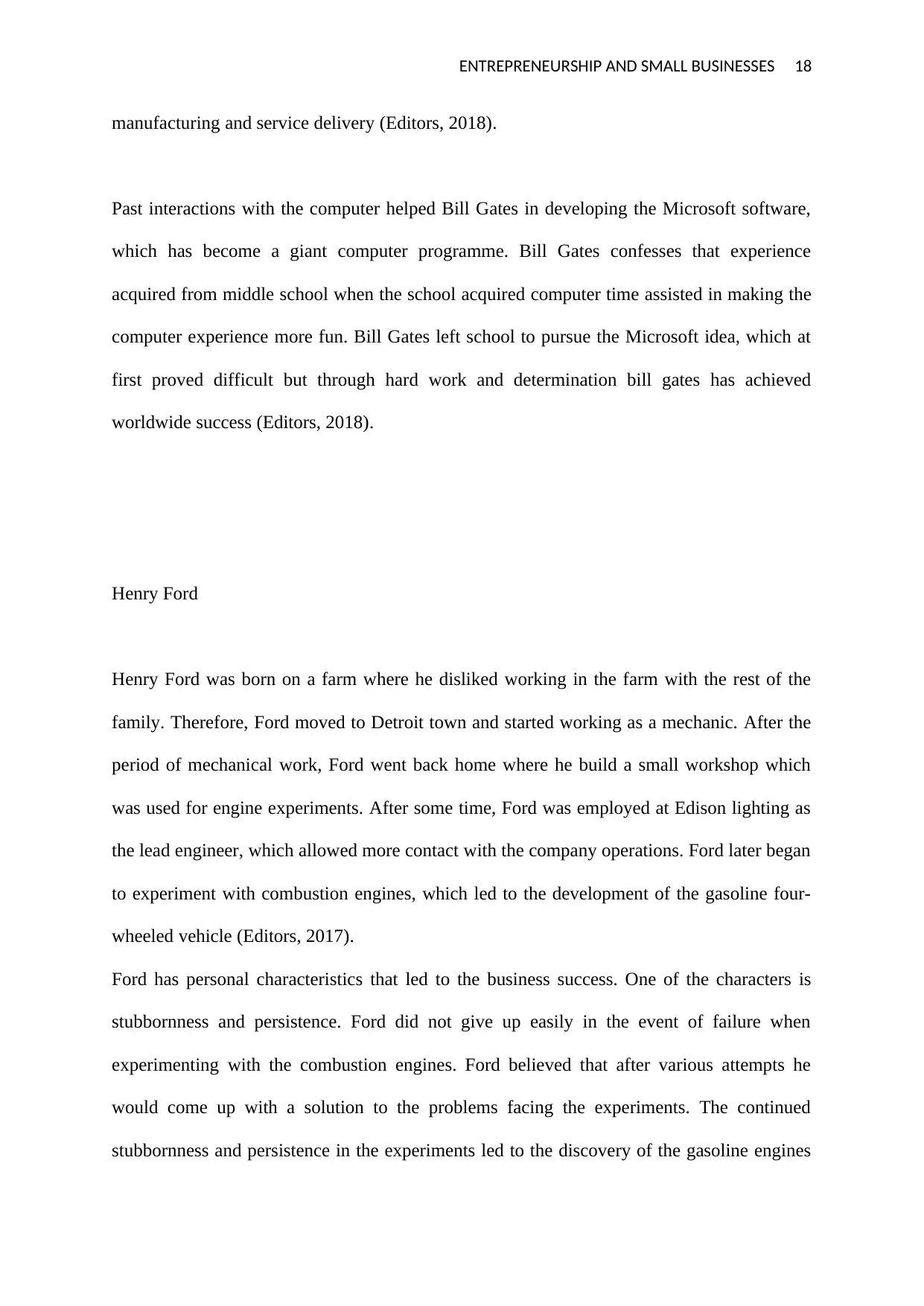
ENTREPRENEURSHIP AND SMALL BUSINESSES 18
manufacturing and service delivery (Editors, 2018).
Past interactions with the computer helped Bill Gates in developing the Microsoft software,
which has become a giant computer programme. Bill Gates confesses that experience
acquired from middle school when the school acquired computer time assisted in making the
computer experience more fun. Bill Gates left school to pursue the Microsoft idea, which at
first proved difficult but through hard work and determination bill gates has achieved
worldwide success (Editors, 2018).
Henry Ford
Henry Ford was born on a farm where he disliked working in the farm with the rest of the
family. Therefore, Ford moved to Detroit town and started working as a mechanic. After the
period of mechanical work, Ford went back home where he build a small workshop which
was used for engine experiments. After some time, Ford was employed at Edison lighting as
the lead engineer, which allowed more contact with the company operations. Ford later began
to experiment with combustion engines, which led to the development of the gasoline four-
wheeled vehicle (Editors, 2017).
Ford has personal characteristics that led to the business success. One of the characters is
stubbornness and persistence. Ford did not give up easily in the event of failure when
experimenting with the combustion engines. Ford believed that after various attempts he
would come up with a solution to the problems facing the experiments. The continued
stubbornness and persistence in the experiments led to the discovery of the gasoline engines
manufacturing and service delivery (Editors, 2018).
Past interactions with the computer helped Bill Gates in developing the Microsoft software,
which has become a giant computer programme. Bill Gates confesses that experience
acquired from middle school when the school acquired computer time assisted in making the
computer experience more fun. Bill Gates left school to pursue the Microsoft idea, which at
first proved difficult but through hard work and determination bill gates has achieved
worldwide success (Editors, 2018).
Henry Ford
Henry Ford was born on a farm where he disliked working in the farm with the rest of the
family. Therefore, Ford moved to Detroit town and started working as a mechanic. After the
period of mechanical work, Ford went back home where he build a small workshop which
was used for engine experiments. After some time, Ford was employed at Edison lighting as
the lead engineer, which allowed more contact with the company operations. Ford later began
to experiment with combustion engines, which led to the development of the gasoline four-
wheeled vehicle (Editors, 2017).
Ford has personal characteristics that led to the business success. One of the characters is
stubbornness and persistence. Ford did not give up easily in the event of failure when
experimenting with the combustion engines. Ford believed that after various attempts he
would come up with a solution to the problems facing the experiments. The continued
stubbornness and persistence in the experiments led to the discovery of the gasoline engines
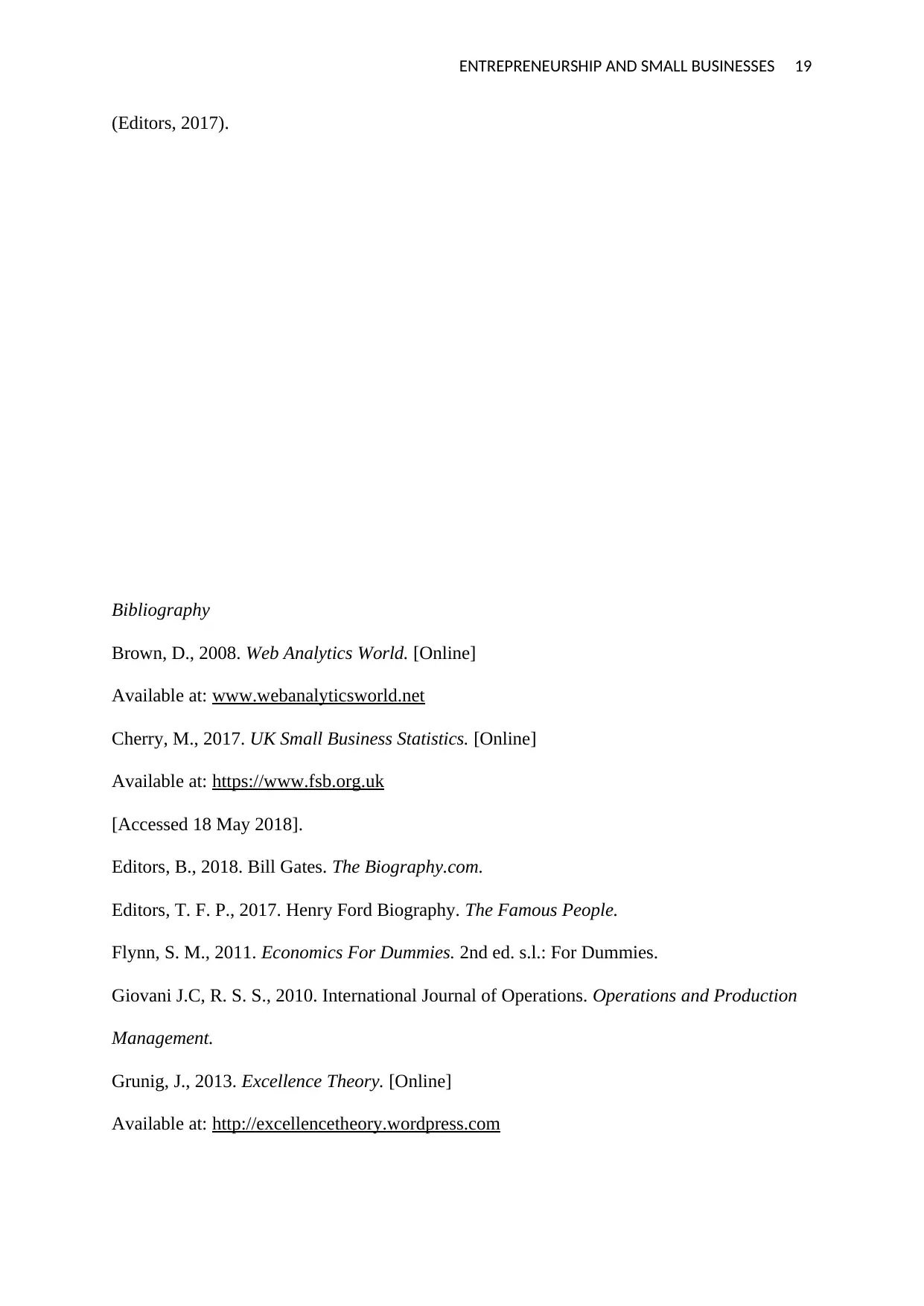
ENTREPRENEURSHIP AND SMALL BUSINESSES 19
(Editors, 2017).
Bibliography
Brown, D., 2008. Web Analytics World. [Online]
Available at: www.webanalyticsworld.net
Cherry, M., 2017. UK Small Business Statistics. [Online]
Available at: https://www.fsb.org.uk
[Accessed 18 May 2018].
Editors, B., 2018. Bill Gates. The Biography.com.
Editors, T. F. P., 2017. Henry Ford Biography. The Famous People.
Flynn, S. M., 2011. Economics For Dummies. 2nd ed. s.l.: For Dummies.
Giovani J.C, R. S. S., 2010. International Journal of Operations. Operations and Production
Management.
Grunig, J., 2013. Excellence Theory. [Online]
Available at: http://excellencetheory.wordpress.com
(Editors, 2017).
Bibliography
Brown, D., 2008. Web Analytics World. [Online]
Available at: www.webanalyticsworld.net
Cherry, M., 2017. UK Small Business Statistics. [Online]
Available at: https://www.fsb.org.uk
[Accessed 18 May 2018].
Editors, B., 2018. Bill Gates. The Biography.com.
Editors, T. F. P., 2017. Henry Ford Biography. The Famous People.
Flynn, S. M., 2011. Economics For Dummies. 2nd ed. s.l.: For Dummies.
Giovani J.C, R. S. S., 2010. International Journal of Operations. Operations and Production
Management.
Grunig, J., 2013. Excellence Theory. [Online]
Available at: http://excellencetheory.wordpress.com
Paraphrase This Document
Need a fresh take? Get an instant paraphrase of this document with our AI Paraphraser
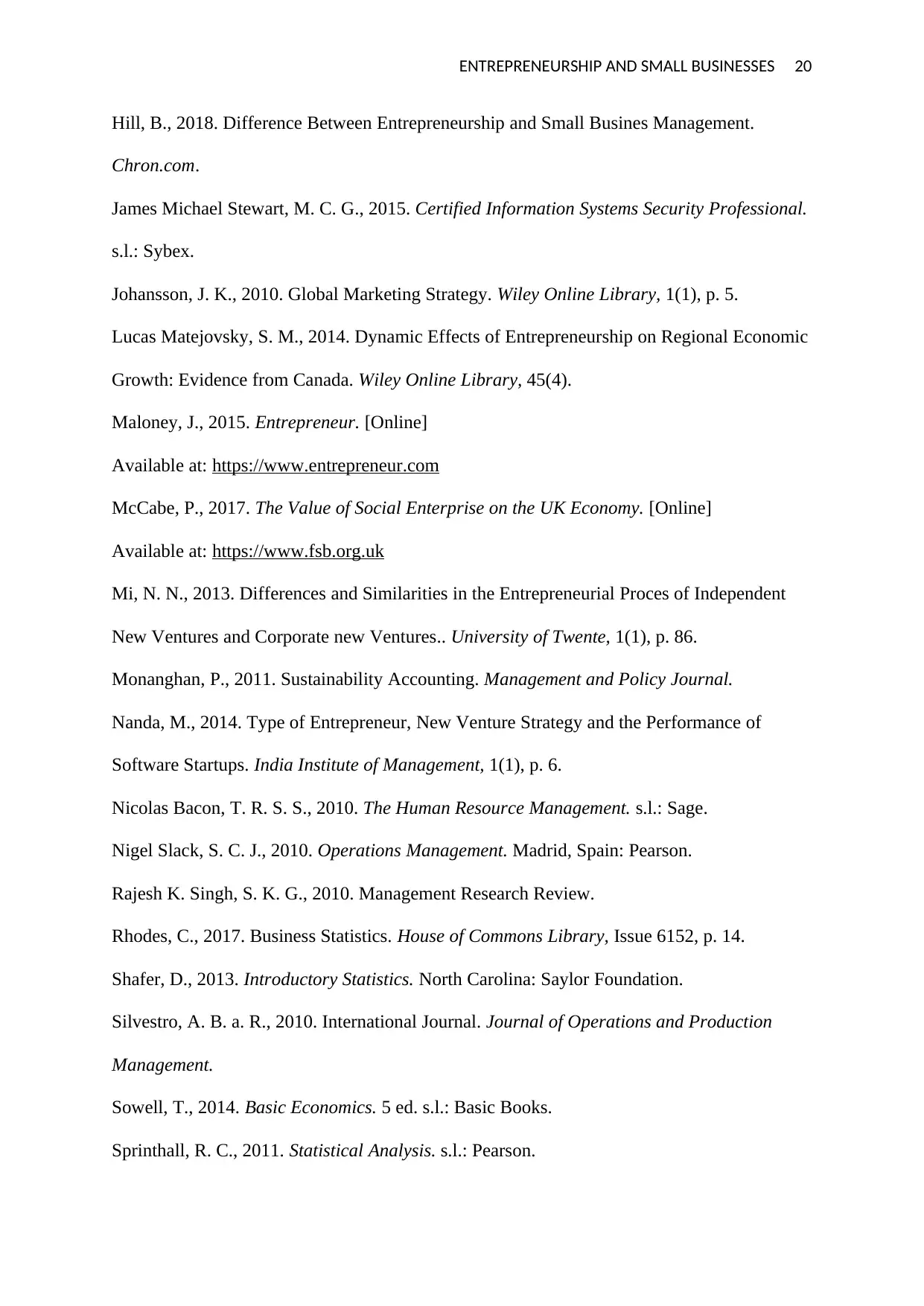
ENTREPRENEURSHIP AND SMALL BUSINESSES 20
Hill, B., 2018. Difference Between Entrepreneurship and Small Busines Management.
Chron.com.
James Michael Stewart, M. C. G., 2015. Certified Information Systems Security Professional.
s.l.: Sybex.
Johansson, J. K., 2010. Global Marketing Strategy. Wiley Online Library, 1(1), p. 5.
Lucas Matejovsky, S. M., 2014. Dynamic Effects of Entrepreneurship on Regional Economic
Growth: Evidence from Canada. Wiley Online Library, 45(4).
Maloney, J., 2015. Entrepreneur. [Online]
Available at: https://www.entrepreneur.com
McCabe, P., 2017. The Value of Social Enterprise on the UK Economy. [Online]
Available at: https://www.fsb.org.uk
Mi, N. N., 2013. Differences and Similarities in the Entrepreneurial Proces of Independent
New Ventures and Corporate new Ventures.. University of Twente, 1(1), p. 86.
Monanghan, P., 2011. Sustainability Accounting. Management and Policy Journal.
Nanda, M., 2014. Type of Entrepreneur, New Venture Strategy and the Performance of
Software Startups. India Institute of Management, 1(1), p. 6.
Nicolas Bacon, T. R. S. S., 2010. The Human Resource Management. s.l.: Sage.
Nigel Slack, S. C. J., 2010. Operations Management. Madrid, Spain: Pearson.
Rajesh K. Singh, S. K. G., 2010. Management Research Review.
Rhodes, C., 2017. Business Statistics. House of Commons Library, Issue 6152, p. 14.
Shafer, D., 2013. Introductory Statistics. North Carolina: Saylor Foundation.
Silvestro, A. B. a. R., 2010. International Journal. Journal of Operations and Production
Management.
Sowell, T., 2014. Basic Economics. 5 ed. s.l.: Basic Books.
Sprinthall, R. C., 2011. Statistical Analysis. s.l.: Pearson.
Hill, B., 2018. Difference Between Entrepreneurship and Small Busines Management.
Chron.com.
James Michael Stewart, M. C. G., 2015. Certified Information Systems Security Professional.
s.l.: Sybex.
Johansson, J. K., 2010. Global Marketing Strategy. Wiley Online Library, 1(1), p. 5.
Lucas Matejovsky, S. M., 2014. Dynamic Effects of Entrepreneurship on Regional Economic
Growth: Evidence from Canada. Wiley Online Library, 45(4).
Maloney, J., 2015. Entrepreneur. [Online]
Available at: https://www.entrepreneur.com
McCabe, P., 2017. The Value of Social Enterprise on the UK Economy. [Online]
Available at: https://www.fsb.org.uk
Mi, N. N., 2013. Differences and Similarities in the Entrepreneurial Proces of Independent
New Ventures and Corporate new Ventures.. University of Twente, 1(1), p. 86.
Monanghan, P., 2011. Sustainability Accounting. Management and Policy Journal.
Nanda, M., 2014. Type of Entrepreneur, New Venture Strategy and the Performance of
Software Startups. India Institute of Management, 1(1), p. 6.
Nicolas Bacon, T. R. S. S., 2010. The Human Resource Management. s.l.: Sage.
Nigel Slack, S. C. J., 2010. Operations Management. Madrid, Spain: Pearson.
Rajesh K. Singh, S. K. G., 2010. Management Research Review.
Rhodes, C., 2017. Business Statistics. House of Commons Library, Issue 6152, p. 14.
Shafer, D., 2013. Introductory Statistics. North Carolina: Saylor Foundation.
Silvestro, A. B. a. R., 2010. International Journal. Journal of Operations and Production
Management.
Sowell, T., 2014. Basic Economics. 5 ed. s.l.: Basic Books.
Sprinthall, R. C., 2011. Statistical Analysis. s.l.: Pearson.
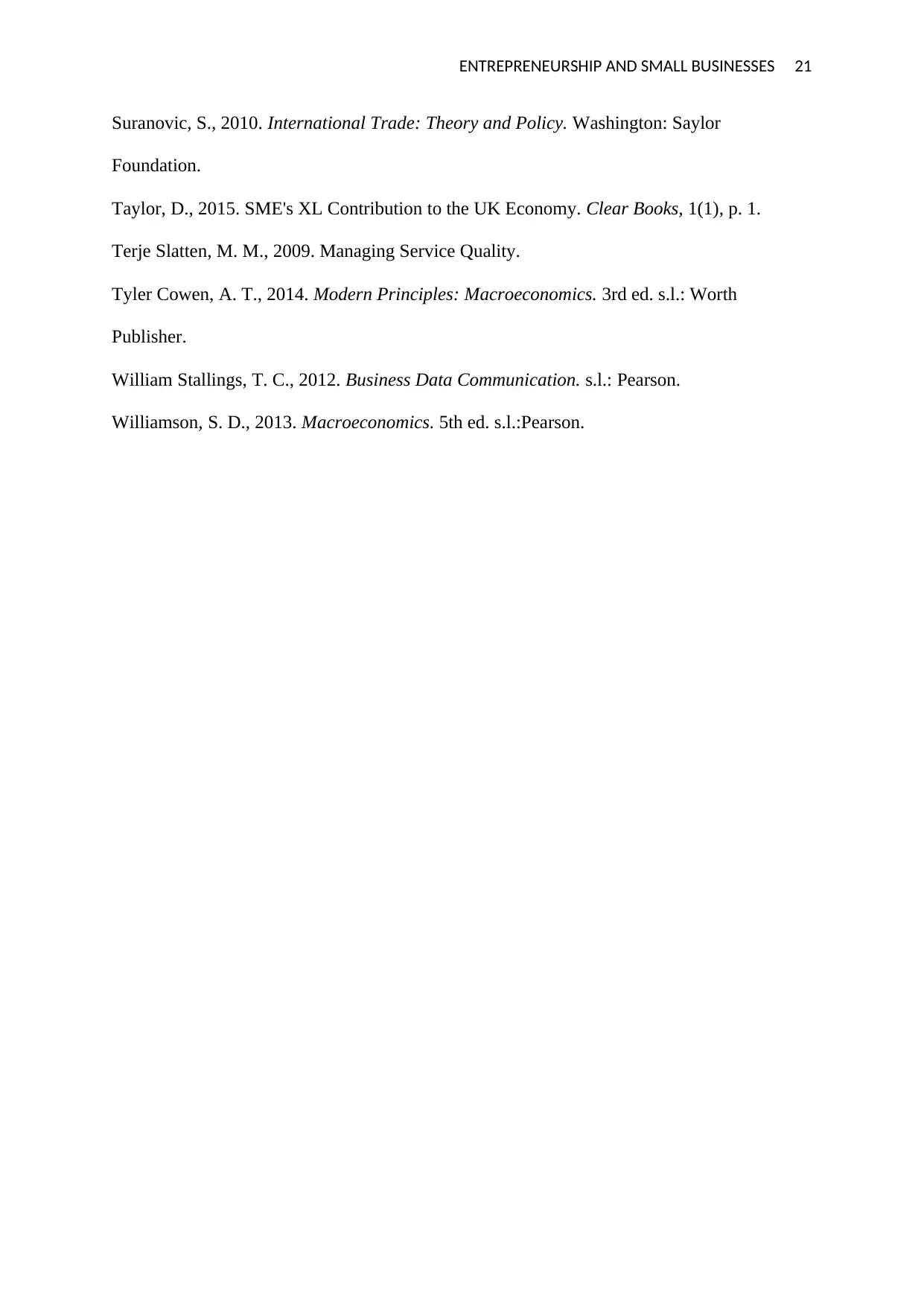
ENTREPRENEURSHIP AND SMALL BUSINESSES 21
Suranovic, S., 2010. International Trade: Theory and Policy. Washington: Saylor
Foundation.
Taylor, D., 2015. SME's XL Contribution to the UK Economy. Clear Books, 1(1), p. 1.
Terje Slatten, M. M., 2009. Managing Service Quality.
Tyler Cowen, A. T., 2014. Modern Principles: Macroeconomics. 3rd ed. s.l.: Worth
Publisher.
William Stallings, T. C., 2012. Business Data Communication. s.l.: Pearson.
Williamson, S. D., 2013. Macroeconomics. 5th ed. s.l.:Pearson.
Suranovic, S., 2010. International Trade: Theory and Policy. Washington: Saylor
Foundation.
Taylor, D., 2015. SME's XL Contribution to the UK Economy. Clear Books, 1(1), p. 1.
Terje Slatten, M. M., 2009. Managing Service Quality.
Tyler Cowen, A. T., 2014. Modern Principles: Macroeconomics. 3rd ed. s.l.: Worth
Publisher.
William Stallings, T. C., 2012. Business Data Communication. s.l.: Pearson.
Williamson, S. D., 2013. Macroeconomics. 5th ed. s.l.:Pearson.
1 out of 21
Related Documents
Your All-in-One AI-Powered Toolkit for Academic Success.
+13062052269
info@desklib.com
Available 24*7 on WhatsApp / Email
![[object Object]](/_next/static/media/star-bottom.7253800d.svg)
Unlock your academic potential
© 2024 | Zucol Services PVT LTD | All rights reserved.




